2008 Awardees
(The following descriptions are excerpts from the CTSA applications and reflect proposed activities.)
Albert Einstein College of Medicine of Yeshiva University
New York, NY
Institute for Clinical and Translational Research
Principal Investigator
Harry Shamoon, M.D.
Participating Institutions and Community Partners:
- Montefiore Medical Center
- The Children's Hospital at Montefiore
- Bronx Health Link
- Clinical Directors Network
- College of New Rochelle School of Nursing
- Lehman College, City University of New York
- New York City Department of Health and Mental Hygiene
- Beth Israel Medical Center
- North Bronx Health Network/Jacobi Medical Center
Description:
 The Institute for Clinical and Translational Research (ICTR) is founded on successful inter-dependent programs, comprised of pediatric and adult patient research facilities; core laboratories; and expanded clinical research training programs, including a Ph.D. in clinical investigation. Jointly supported by the Albert Einstein College of Medicine and Montefiore Medical Center, the ICTR encourages the development of new methods and approaches to bidirectional clinical and translational research. One focus will be on the improvement of education, training, and mentoring to aid new investigators in navigating the increasingly complex research system, while taking advantage of newly designed and improved biomedical research informatics tools. The ICTR actively engages the ethnically diverse communities of the Bronx, made up of 1.4 million people, collaborating with regional and affiliated institutions to expand research and training opportunities throughout the Bronx community. The ICTR builds upon existing clinical research programs, such as the Hispanic Community Health Study; on interdisciplinary centers in diabetes, cancer, liver, health disparities, neuroscience, transplantation, and HIV/AIDS; and on an expanding base of translational research faculty in genetics, systems biology, and stem cell research—many of whom are housed in a new state-of-the-art facility. The ICTR will enhance community collaboration and participation in its research, as well as expand and develop partnerships with community organizations in the Bronx. During the past two years, the Clinical and Translational Science Award development process has involved a broad range of faculty from numerous disciplines (including medicine, dentistry, nursing, epidemiology, social work, and biomedical sciences) through these transformative partnerships.
The Institute for Clinical and Translational Research (ICTR) is founded on successful inter-dependent programs, comprised of pediatric and adult patient research facilities; core laboratories; and expanded clinical research training programs, including a Ph.D. in clinical investigation. Jointly supported by the Albert Einstein College of Medicine and Montefiore Medical Center, the ICTR encourages the development of new methods and approaches to bidirectional clinical and translational research. One focus will be on the improvement of education, training, and mentoring to aid new investigators in navigating the increasingly complex research system, while taking advantage of newly designed and improved biomedical research informatics tools. The ICTR actively engages the ethnically diverse communities of the Bronx, made up of 1.4 million people, collaborating with regional and affiliated institutions to expand research and training opportunities throughout the Bronx community. The ICTR builds upon existing clinical research programs, such as the Hispanic Community Health Study; on interdisciplinary centers in diabetes, cancer, liver, health disparities, neuroscience, transplantation, and HIV/AIDS; and on an expanding base of translational research faculty in genetics, systems biology, and stem cell research—many of whom are housed in a new state-of-the-art facility. The ICTR will enhance community collaboration and participation in its research, as well as expand and develop partnerships with community organizations in the Bronx. During the past two years, the Clinical and Translational Science Award development process has involved a broad range of faculty from numerous disciplines (including medicine, dentistry, nursing, epidemiology, social work, and biomedical sciences) through these transformative partnerships.
Photo: Pediatric clinical research is a vital component of the enterprise sponsored by the Einstein-Montefiore Institute for Clinical and Translational Research. Download Photo (37KB JPG)
Boston University
Boston, MA
Clinical and Translational Science (BU-BRIDGE) Institute
Principal Investigator
David M. Center, M.D.
Participating Institutions and Community Partners:
- Boston Medical Center
- Veterans Administration, Boston Healthcare System
- Framingham Heart Study
- Boston HealthNet
- National Emerging Infectious Diseases Laboratories
- Northeast Center for Research to Evaluate & Eliminate Dental Disparities
- Partners in Health and Housing Prevention Research Center
Description:
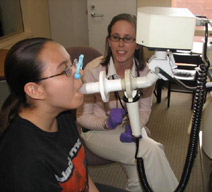
The Boston University Clinical and Translational Science (BU-BRIDGE) Institute will integrate, connect, and expand research and programs across traditional academic departments and schools. The institute will act as a bridge between disciplines to facilitate interactions by incorporating multiple key programs that support the university-wide commitment to a home for translational research. The CTSA award will allow the Institute to build on existing strengths to create an environment linking faculty members, trainees, and university programs to speed the translation of innovations in medical science to improve maintenance of health and diagnosis and treatment of diseases and share these innovations with other University-based Clinical and Translational Science Awards. The BU-BRIDGE environment also will support the bi-directional development and translation of ideas that begin in the clinic to the BU scientific community and back to identify new ways to improve health and delivery of health care services. Moreover, the Institute will significantly enhance existing partnerships with Boston's community health centers, transforming the conduct of clinical and translational research by infusing it with community-based perspectives and needs.
Photo: Lisa Gagalis, R.N. (right), a study coordinator in the General Clinical Research Center (GCRC) at Boston University Medical Campus, performs lung function testing on research participant Ashley Mendez, who is enrolled in a clinical trial of omalizumab, a new antibody-based treatment for asthma. This trial is being conducted as part of the Inner-City Asthma Consortium funded by NIAID of the NIH. The new BU Clinical and Translational Institute (BU-BRIDGE) will include the GCRC and fund a hospital and university-wide institute that will add multiple other programs to the portfolio of resources available for clinical researchers, including community outreach, research ethics, and bioinformatics to further translate basic science discoveries into improvements in the diagnosis and treatment of human diseases. (Photo by Vivian Borek) Download Photo (33KB JPG)
Harvard University
Cambridge, MA
Harvard Clinical and Translational Science Center
Principal Investigator
Lee M. Nadler, M.D.
Participating Institutions and Community Partners:
- Harvard Affiliated Academic Health Care Institutions
- Beth Israel-Deaconess Medical Center
- Brigham and Women's Hospital
- Children's Hospital Boston
- Dana-Farber Cancer Institute
- Forsyth Institute
- Joslin Diabetes Center
- Massachusetts Eye and Ear Infirmary
- Massachusetts General Hospital
- McLean Hospital
- Mount Auburn Hospital
- Schepens Eye Research Institute
- Spaulding Rehabilitation Hospital
- VA Boston Healthcare System
- Collaborative Academic Institutions
- Massachusetts Institute of Technology
- Broad Institute
- Community Healthcare Institutions
- Cambridge Health Alliance
- Harvard Medical School Department of Ambulatory Care and Prevention at Harvard Pilgrim Healthcare
- Harvard University
- Harvard Medical School
- Harvard School of Dental Medicine
- Harvard School of Public Health
- Harvard University Faculty of Arts and Sciences
- Harvard School of Engineering and Applied Sciences
- Harvard Business School
- Harvard Law School
- Harvard Divinity School
- Kennedy School of Government
- Harvard Graduate School of Education
- Radcliffe Institute for Advanced Study
Description:
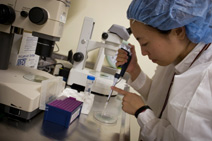 The Harvard Clinical and Translational Science Center will alter the culture of clinical and translational research at Harvard by creating structured and effective methods to connect and support individual investigators and teams of investigators. The center will create managed approaches to focusing the skills of experts in diverse disciplines to find innovative solutions to challenging questions in clinical and translational research. It will deploy both new and old resources more effectively, lowering the barriers to the initiation and conduct of clinical and translational research within and across institutions.
The Harvard Clinical and Translational Science Center will alter the culture of clinical and translational research at Harvard by creating structured and effective methods to connect and support individual investigators and teams of investigators. The center will create managed approaches to focusing the skills of experts in diverse disciplines to find innovative solutions to challenging questions in clinical and translational research. It will deploy both new and old resources more effectively, lowering the barriers to the initiation and conduct of clinical and translational research within and across institutions.
In parallel, the center will build a structure to encourage initiation of new clinical and translational research projects and provide mechanisms for bringing together interdisciplinary and cross-institutional teams, opening the doors of the clinical and translational research enterprise to researchers and engineers with diverse backgrounds, skills, and resources. The center will educate the broader Harvard research community on the opportunities, challenges, and goals of clinical and translational research.
The overarching goals focus on the individual development of clinical and translational researchers and alignment of incentives with desired outcomes. Structured processes will be created that will enhance the ability of investigators to identify information, seek expertise, and access tools necessary to conceive and successfully complete clinical and translational experiments.
Photo: Akiko Yabuuchi, a Ph.D. in George Daley's lab at Children's Hospital Boston, conducts stem cell research inside a clean room. Daley is a faculty member at Harvard Medical School and part of the Harvard Stem Cell Institute. (Photo by Justin Ide/Harvard University News Office) Download Photo (4.5MB JPG)
Indiana University School of Medicine
Indianapolis, IN
Indiana Clinical and Translational Science Institute
Principal Investigator
Anantha Shekhar, M.D., Ph.D.
Participating Institutions and Community Partners:
- Purdue University
- BioCrossroads
- Clarian Health Partners
- Cook Group, Incorporated
- Eli Lilly and Company
- Richard M. Fairbanks Foundation
- Fairbanks Institute for Healthy Communities
- Indiana State Government
- Indiana Health Information Exchange
- Indiana Network for Patient Care
- Regenstrief Foundation
- Regenstrief Institute
- Roudebush VA Medical Center
- Wellpoint, Inc.
- Wishard Health Services
- Indiana University
Description:
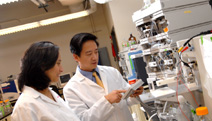 The Indiana Clinical and Translational Science Institute (CTSI) will increase translational biomedical research and improve the health of the people of Indiana and beyond. The Indiana CTSI has developed enhanced educational programs to train translational researchers; a newly designed community engagement activity to produce effective and bidirectional community partnerships; a streamlined process for all available research infrastructure to accelerate translational projects; and a partnership with commercial and philanthropic organizations in Indiana. The critical link connecting all of these efforts is the university's medical informatics program that enables all parties to interact in an easy, responsive and prompt manner. Thus, the Indiana CTSI brings together the research resources of the entire state. It will provide the national network of CTSAs with a statewide laboratory to experiment with innovative methods aimed at transforming research in biomedical sciences, health economy, health care delivery and health policy. It will create pilot projects, train translational researchers, foster community engagement, build research resources and technologies, and leverage the resources of the Greater Indiana Community.
The Indiana Clinical and Translational Science Institute (CTSI) will increase translational biomedical research and improve the health of the people of Indiana and beyond. The Indiana CTSI has developed enhanced educational programs to train translational researchers; a newly designed community engagement activity to produce effective and bidirectional community partnerships; a streamlined process for all available research infrastructure to accelerate translational projects; and a partnership with commercial and philanthropic organizations in Indiana. The critical link connecting all of these efforts is the university's medical informatics program that enables all parties to interact in an easy, responsive and prompt manner. Thus, the Indiana CTSI brings together the research resources of the entire state. It will provide the national network of CTSAs with a statewide laboratory to experiment with innovative methods aimed at transforming research in biomedical sciences, health economy, health care delivery and health policy. It will create pilot projects, train translational researchers, foster community engagement, build research resources and technologies, and leverage the resources of the Greater Indiana Community.
Photo: Mu Wang, Ph.D., (right) director of the Protein Analysis and Research Center, and Attaya Suvannasankha, M.D., assistant professor of medicine, are employing proteomics tools to find biomarkers for multiple myeloma at Indiana University School of Medicine. Download Photo (417KB JPG)
Northwestern University
Evanston and Chicago, IL
Northwestern University Clinical and Translational Sciences Institute
Principal Investigator
Philip Greenland, M.D.
Participating Institutions and Community Partners:
- Children's Memorial Hospital
- Evanston Northwestern Healthcare
- Northwestern Medical Faculty Foundation
- Northwestern Memorial Hospital
- Rehabilitation Institute of Chicago
- Infant Welfare Society
- Consortium to Lower Obesity in Chicago Children
- Chicago Metropolitan Agency for Planning
- Center for Cultural Understanding and Change, Field Museum
- Practice-based Research Networks
- The Pediatric Practice Research Group (PPRG), based at Children's Memorial Hospital
- The Research and Education for Academic Achievement (REACH) Network, directed by the Feinberg School of Medicine, Division of General Internal Medicine
- Evanston Northwestern Healthcare Network, directed by faculty in the Department of Family Medicine
Description:
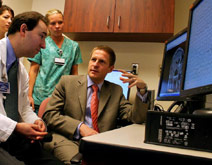 The Northwestern University Clinical and Translational Sciences Institute (NUCATS) is dedicated to facilitating, supporting, and promoting research that results in better medical treatments and improved health care. NUCATS is the physical home and central hub for translational research across the Northwestern University enterprise. The institute is composed of five centers, and participation spans several geographic locations, including the involvement of all four NU-affiliated hospitals and six NU schools located on two campuses: the Feinberg School of Medicine; the Kellogg School of Management; the McCormick School of Engineering and Applied Science; the School of Communication; the School of Education and Social Policy; and the Weinberg College of Arts and Sciences. Basic scientists, medical practitioners, community-based medical practitioners, and community-based organizations are working together with leaders in the fields of communications, education, business, and public health to eliminate barriers to innovation.
The Northwestern University Clinical and Translational Sciences Institute (NUCATS) is dedicated to facilitating, supporting, and promoting research that results in better medical treatments and improved health care. NUCATS is the physical home and central hub for translational research across the Northwestern University enterprise. The institute is composed of five centers, and participation spans several geographic locations, including the involvement of all four NU-affiliated hospitals and six NU schools located on two campuses: the Feinberg School of Medicine; the Kellogg School of Management; the McCormick School of Engineering and Applied Science; the School of Communication; the School of Education and Social Policy; and the Weinberg College of Arts and Sciences. Basic scientists, medical practitioners, community-based medical practitioners, and community-based organizations are working together with leaders in the fields of communications, education, business, and public health to eliminate barriers to innovation.
Photo: Dr. Stephan Schuele (right) leads the Northwestern University Comprehensive Epilepsy Center based at Northwestern Memorial Hospital. The center's team of neurologists, neurosurgeons, radiologists, neuropsychologists, electrophysiologists, and nuclear medicine specialists apply the latest advances in molecular biology, imaging, and pharmacology to diagnose and treat epilepsy. Download Photo (70KB JPG)
The Ohio State University
Columbus, OH
The Ohio State University Center for Clinical and Translational Science
Principal Investigator
Rebecca Jackson, M.D.
Participating Institutions and Community Partners:
- Nationwide Children's Hospital
- Battelle Memorial Institute
- Appalachia Community Cancer Network
- State of Ohio Comprehensive Program for the Prevention, Detection, and Treatment of Lung Cancer
- The Kroger Company
- Faith Mission
- The Ohio State University Extension Agency
- Ohio Public Schools
- Metro High School
- The Ohio State Health Network
- Primary Care Research Network
- Columbus Osteopathic Association
Description:
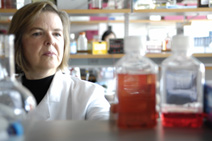 The Ohio State University has established the Center for Clinical and Translational Science (OSU CCTS) to improve the quality of care for all patients in the community by creating a transformative clinical and translational science discipline that is at the core of the OSU academic culture. It will support a robust and integrated partnership between the Ohio State University and Nationwide Children's Hospital and will link these sophisticated health care systems as a laboratory for biological, clinical and behavioral research. By also working through affiliated hospital networks, a primary care network and extension offices in all 88 counties in Ohio, the OSU CCTS will allow clinical and translational research to be accomplished in innovative collaboration with the community. As part of its community engagement plans, the OSU CCTS has selected the Appalachian region of Ohio as an area of emphasis—an area with some of the state's highest poverty rates. Expanding its community-based research programs to include unique partnerships with the Appalachia Community Cancer Network and Partners for Kids, a Nationwide Children's Hospital organization, will provide clinical research opportunities to this rural community.
The Ohio State University has established the Center for Clinical and Translational Science (OSU CCTS) to improve the quality of care for all patients in the community by creating a transformative clinical and translational science discipline that is at the core of the OSU academic culture. It will support a robust and integrated partnership between the Ohio State University and Nationwide Children's Hospital and will link these sophisticated health care systems as a laboratory for biological, clinical and behavioral research. By also working through affiliated hospital networks, a primary care network and extension offices in all 88 counties in Ohio, the OSU CCTS will allow clinical and translational research to be accomplished in innovative collaboration with the community. As part of its community engagement plans, the OSU CCTS has selected the Appalachian region of Ohio as an area of emphasis—an area with some of the state's highest poverty rates. Expanding its community-based research programs to include unique partnerships with the Appalachia Community Cancer Network and Partners for Kids, a Nationwide Children's Hospital organization, will provide clinical research opportunities to this rural community.
Photo: Caroline Whitacre, Ph.D., one of the world's most acknowledged authorities on autoimmune disease, is among hundreds of scientists at The Ohio State University Medical Center who translate innovative research findings into personalized patient care. (Photo courtesy of The Ohio State University Medical Center) Download Hi-Res Photo (2.4MB JPG)
The Scripps Research Institute
La Jolla, CA
The Scripps Translational Science Institute
Principal Investigator
Eric J. Topol, M.D.
Participating Institutions and Community Partners:
- The Neurosciences Institute
- J Craig Venter Institute
- San Diego Supercomputer Center
- Genomics Institute of the Novartis Research Foundation
- Salk Institute
- The Center for Applied Genomics at Children's Hospital of Philadelphia
- San Diego State University
- Burnham Institute
- Whittier Institute
- Scripps Clinic Medical Group
- County of San Diego Free Clinics
- Community Health Improvement Partners
- San Diego Border Area Health Education Center
- Chula Vista Family Health Center
- Southeast San Diego Elementary Schools
- Retinal Consulting Services
- Indian Health Council
- 15 Community Health Centers
- 25 San Diego Area Life Science Companies
Description:
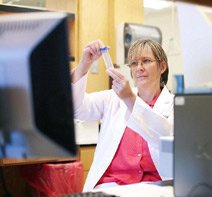 The Scripps Translational Science Institute (STSI) will emphasize three dimensions of translation: traditional bench to bedside, bedside to bench and back to bedside, and bedside to the community and practice of medicine. The vision of this program provides the appropriate amalgam of "integration and innovation" and opportunity to capitalize on particular strengths at The Scripps Research Institute, Scripps Health, and partnering institutions and faculty members that have led to the development of the goals of the STSI. Building upon and establishing specific collaborations with leading translational science and clinical investigators will accelerate discovery that has impact across multiple research disciplines. Collaborations with a large subset of the 550 life science companies in San Diego provide an extraordinary advantage for accessing innovative technology and catalyzing benefits to patients. STSI exploits the excitement of today's scientific advances to advance tomorrow's preventions, betterment of health, and the training of the future leaders of academic medicine.
The Scripps Translational Science Institute (STSI) will emphasize three dimensions of translation: traditional bench to bedside, bedside to bench and back to bedside, and bedside to the community and practice of medicine. The vision of this program provides the appropriate amalgam of "integration and innovation" and opportunity to capitalize on particular strengths at The Scripps Research Institute, Scripps Health, and partnering institutions and faculty members that have led to the development of the goals of the STSI. Building upon and establishing specific collaborations with leading translational science and clinical investigators will accelerate discovery that has impact across multiple research disciplines. Collaborations with a large subset of the 550 life science companies in San Diego provide an extraordinary advantage for accessing innovative technology and catalyzing benefits to patients. STSI exploits the excitement of today's scientific advances to advance tomorrow's preventions, betterment of health, and the training of the future leaders of academic medicine.
Photo: Kelly Frazer, Ph.D., director of genomics research at Scripps Translational Science Institute in San Diego, is working on an integrated Omics Program that studies the intersection of genomics, proteomics, and glycomincs and their influence on disease. She is researching how a piece of chromosome 9 (called 9p21) contributes to heart disease. Download Photo (48KB JPG)
Stanford University
Palo Alto, CA
The Stanford Center for Clinical and Translational Education and Research
Principal Investigator
Harry Greenberg, M.D.
Participating Institutions and Community Partners:
- Kaiser Permanente Division of Research
- The Palo Alto Medical Foundation for Health Care, Research, and Education
- Veterans Affairs Palo Alto Health care System
- Northern California Cancer Center
- Community Partners
- Santa Clara Valley Medical Center
- Gardner Family Health Network
- Community Health Partnership of Santa Clara County
- Other Outreach Efforts
- YMCA of the USA Activate America Program
- Mountain View-Los Altos Challenge Team
- Adolescent Pregnancy Prevention Network
- Stanford University
- Schools: Business, Earth Sciences, Education, Engineering, Humanities & Sciences, Law, Medicine
- Independent Centers: Bio-X, Freeman Spoogli Institute, Stanford Center on Longevity, Woods Institute on the Environment, Institute for Research in the Social Sciences
- Stanford Hospital & Clinics and Lucile Packard Children's Hospital
- The Center for Healthy Weight
Description:
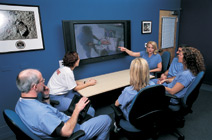 The Stanford Center for Clinical and Translational Education and Research will pursue a multidisciplinary approach to transform and integrate critical components of clinical and translational research related to human health across Stanford University's academic and clinical enterprise. The goals of the Center are: to effectively convert basic discoveries into practical methods that will improve human health; and to prepare the next generation of research leaders to ensure that the translation of discoveries into benefits in human health continues into the future. This mission will be accomplished through a series of coordinated and synergistic transformative changes in their educational and mentoring programs, institutional governance structure, research support infrastructure, and the professoriate, which are all intended to promote clinical and translational research at Stanford and in the community.
The Stanford Center for Clinical and Translational Education and Research will pursue a multidisciplinary approach to transform and integrate critical components of clinical and translational research related to human health across Stanford University's academic and clinical enterprise. The goals of the Center are: to effectively convert basic discoveries into practical methods that will improve human health; and to prepare the next generation of research leaders to ensure that the translation of discoveries into benefits in human health continues into the future. This mission will be accomplished through a series of coordinated and synergistic transformative changes in their educational and mentoring programs, institutional governance structure, research support infrastructure, and the professoriate, which are all intended to promote clinical and translational research at Stanford and in the community.
The vision for the Stanford Center is to transform the goals of the institution to incorporate the needs and priorities of the local community while continuing to promote research. To realize this vision, Stanford is creating an office of community research to create and establish bi-directional information flow between the community and investigators, making the community a true partner in setting the research agenda and priorities. The Office of Community Research will serve as a single point of contact for community groups and Stanford investigators, with the goals that include enhancing understanding of local community needs and priorities and improving dissemination of key research results to the local community to promote health and improved clinical practice.
Photo: A team reviews tape of a simulated birth at the Center for Pediatric Education at Lucile Packard Children's Hospital. The CAPE facility is the world's first dedicated pediatric and obstetric medical simulation center, allowing health-care professionals to hone their skills in a simulated medical environment. Lucile Packard Children's Hospital is a participating institution in the Stanford Center for Clinical and Translational Education and Research. (Photo courtesy of Lucile Packard Children's Hospital) Download Hi-Res Photo (5.7MB TIF)
Tufts University
Boston, MA
Tufts Clinical and Translational Science Institute
Principal Investigator
Harry Selker, M.D.
Participating Institutions and Community Partners:
Clinical and academic organizations
- New England Quality Care Alliance Physician Practice Group
- Tufts Medical Center Institute for Clinical Research and Health Policy Studies
- Tufts Center for the Study of Drug Development
- The Jean Mayer USDA Human Nutrition Research Center on Aging (HNRCA)
- Brandeis University's Heller School and Schneider Institutes for Health Policy
- The Framingham Heart Study
- Northeastern University's Bouvé College of Health Sciences
- University of Massachusetts School of Nursing
- The National Kidney Foundation
Community-based organizations
- Asian American Center for Cancer Education and Research
- Boston Chinatown Neighborhood Center
- Boston Museum of Science
- Boston Neighborhood Development Office
- Boston Public Health Commission
- Center for Community Health Education Research and Service
- Codman Square Health Center/ Dorchester House Multi-Service Center of the Dorchester Health Initiative
- La Alianza Hispana
- Massachusetts Department of Public Health
- Partners for a Health Community
- Somerville Community Health Agenda (of the Institute for Community Health)
Heath plans
- Blue Cross Blue Shield of Massachusetts
- Tufts Health Plan
Industry partners
- Advanced Magnetics, Inc.
- Biogen Idec
- Millennium Pharmaceuticals
- Neurologica Corporation
- Pfizer, Inc.
Tufts University schools
- Arts and Sciences
- Citizenship and Public Service
- Dental Medicine
- Engineering (including Computer Science and Bioengineering)
- Graduate Biomedical Sciences
- Medicine
- Nutrition
- Veterinary Medicine
Tufts-affiliated hospitals
- Tufts Medical Center
- Baystate Medical Center
- Caritas St. Elizabeth's Medical Center
- Lahey Clinic
- New England Sinai Rehabilitation Hospital
- New England Baptist Hospital
- Newton-Wellesley Hospital
- Caritas Carney Hospital
Description:
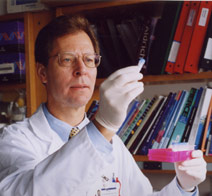 The Tufts Clinical and Translational Science Institute will build on long-standing traditions of multidisciplinary collaboration. The Institute will leverage that history to produce ground-breaking translation research to bring therapies to patients more quickly. Among the endeavors the institute will undertake will be a program aimed at cultivating connections between researchers and community groups, transforming the research process by developing ways for these groups to learn about each other's needs, interests and perspectives. The program includes annual needs assessments with community partners to identify perceived health needs and research priorities. This partnership will facilitate the recruitment of diverse participants in research efforts to accelerate the adoption of evidence-based care into clinical practice settings. The emphasis on community involvement uniquely reflects both Tufts University and Tufts Medical Center's dedication to active citizenship and biomedical research by including multiple hospitals, community organizations, health plans, industry, and others in Massachusetts and nationally.
The Tufts Clinical and Translational Science Institute will build on long-standing traditions of multidisciplinary collaboration. The Institute will leverage that history to produce ground-breaking translation research to bring therapies to patients more quickly. Among the endeavors the institute will undertake will be a program aimed at cultivating connections between researchers and community groups, transforming the research process by developing ways for these groups to learn about each other's needs, interests and perspectives. The program includes annual needs assessments with community partners to identify perceived health needs and research priorities. This partnership will facilitate the recruitment of diverse participants in research efforts to accelerate the adoption of evidence-based care into clinical practice settings. The emphasis on community involvement uniquely reflects both Tufts University and Tufts Medical Center's dedication to active citizenship and biomedical research by including multiple hospitals, community organizations, health plans, industry, and others in Massachusetts and nationally.
Photo: Hans Klingemann, M.D., is director of the Bone Marrow and Hematopoietic Cell Transplant Program at Tufts Medical Center. This program is an example of the clinical and translational research being conducted by Tufts Medical Center and Tufts University researchers. (Photo courtesy of Tufts Medical Center) Download Hi-Res Photo (920KB JPG)
The University of Alabama at Birmingham
Birmingham, AL
UAB Center for Clinical and Translational Science
Principal Investigator
Lisa M. Guay-Woodford, M.D.
Participating Institutions and Community Partners:
- UAB Health System
- Children's Health System
- Southern Research Institute
- HudsonAlpha Institute for Biotechnology
- UAB Outreach Sites including Alabama urban and rural communities
- Alabama's Historically Black Colleges and Universities
Description:
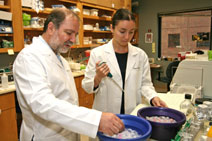
The vision of the UAB Center for Clinical and Translational Science is to transform the university's environment by building productive and efficient interdisciplinary research teams through educational ingenuity, regulatory reorganization, resource coordination, and methodological innovation. The mission is to develop a transformative infrastructure that spans the spectrum from preclinical research to bench-to-bedside translation to community implementation. This center builds upon a long-standing collaborative network that involves Historically Black Colleges and Universities and underprivileged communities in its region.
Using the community health advisor model, UAB CCTS investigators have a strong record of NIH- and CDC-funded community-based participatory research involving the Alabama "Black Belt", one of the nation's most underserved areas. Further, in collaboration with Alabama's Historically Black Colleges and Universities, they have built an extensive network for training the next generation of health disparities researchers. The CCTS will provide the crucible to bring these activities to the next level. Through its innovative "One Great Community" component, the CCTS will support three community incubators (Urban Lay, Health Professionals, and University), as well as a Research Incubator to insure the bidirectional flow of information between the lay and the research communities that will generate new knowledge at the intersection between science and community needs.
Photo: Professor Victor Darley-Usmar, Ph.D., and post-doctoral fellow Elena Ulasova perform research to understand how diabetes and dietary factors impact on mitochondrial function in the heart. A better understanding of these processes will help in designing new therapies for treatment of diabetic patients. Download Hi-Res Photo (2MB JPG)
University of Colorado Denver
Anschutz Medical Campus in Aurora, CO
Colorado Clinical and Translational Sciences Institute
Principal Investigator
Ronald J. Sokol, M.D.
Participating Institutions and Community Partners:
- University of Colorado at Boulder
- University of Colorado Hospital
- The Children's Hospital
- Denver Health
- National Jewish Medical and Research Center
- Kaiser Permanente Colorado
- Denver Veterans Affairs Medical Center
- Colorado Foundation for Public Health and Environment
- Colorado Pharmacy Practice Education & Research Network
- Rocky Mountain Altitude Network
- Colorado Research Network
- American Indian/Alaska Native (AI/AN) Programs
- National Surgical Quality Improvement Program
- Nurse Family Partnership
- Colorado Cardiovascular Outcomes Research
- Catholic Churches
- Population-based Palliative Care Research Network
- LUCHAR-Latinos Using Cardio Health Actions to Reduce Risk
- Denver Metro Emergency Network
- Stapleton 2040
- American Academy of Family Physicians National Research Network
- Colorado Children's Healthcare Access Program
- Building Investigative Practices for Better Health Outcomes
- High Plains Research Network
Description:
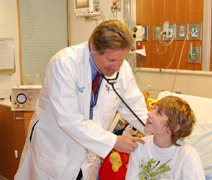 The University of Colorado Denver and its affiliates will use this award to speed biomedical discoveries from laboratories to the lives of citizens. The university and its partners will create an unprecedented statewide network of research, health care and community facilities. Working together, the new Colorado Clinical and Translational Sciences Institute (CCTSI) will turn biomedical findings into improved patient and community health. The CCTSI will coordinate the efforts of scientists, health care providers, and advocates from two research universities, six health care professional schools, five hospitals, a health care network, and more than a dozen community health programs.
The University of Colorado Denver and its affiliates will use this award to speed biomedical discoveries from laboratories to the lives of citizens. The university and its partners will create an unprecedented statewide network of research, health care and community facilities. Working together, the new Colorado Clinical and Translational Sciences Institute (CCTSI) will turn biomedical findings into improved patient and community health. The CCTSI will coordinate the efforts of scientists, health care providers, and advocates from two research universities, six health care professional schools, five hospitals, a health care network, and more than a dozen community health programs.
The Institute's five goals will be to: convert laboratory discoveries into clinical use; bring clinical advances into communities; apply new technologies to deliver personalized medicine; train future researchers; and advance child and maternal health. A dynamic Partnership of Academicians and Communities for Translation (PACT) will facilitate exchanges between communities and academic programs that let scientists share discoveries with communities, but at the same time let communities tell scientists what medical and public health needs should be addressed. CCTSI will commit personnel and informatics resources to six diverse and well-developed community partnerships as the initial focus for launching this shared translational research agenda. Following initial testing in these communities, CCTSI will adapt successful models to the remaining PACT communities. Eventually, the PACT should have an impact on the health care of all of Colorado's more than 4 million residents and the 1,300 physician practices and 300 hospitals that serve them.
Photo: Dr. Ronald J. Sokol, principal investigator for the University of Colorado Denver's CTSI, examines 14-year-old Matt Gordon who is participating in research studies that will translate discoveries into new treatments for cystic fibrosis. Download Photo (68KB JPG)
The University of North Carolina at Chapel Hill
Chapel Hill, NC
Translational and Clinical Science (TraCS) Institute
Principal Investigator
Paul Watkins, M.D.
Participating Institutions:
- RTI International
- Area L Health Education Center
- Coastal Area Health Education Center
- Carolinas Medical Center
- North Carolina State University
- North Carolina Central University
- Eastern Carolina University
- North Carolina Agricultural and Technical State University
- University of North Carolina at Charlotte
Description:
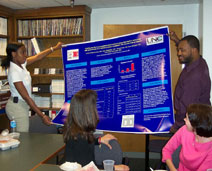 The University of North Carolina at Chapel Hill solicited input from over 300 faculty, administrators, and other stakeholders, drawn not just from the university but across the state, to establish the Translational and Clinical Sciences (TraCS) Institute. The TraCS Institute will transform the way research is performed in the state by partnering with communities to more rapidly and efficiently "translate" scientific discoveries into improvements in the health of citizens. The TraCS Institute has three simple goals: prepare and empower faculty, health care providers, and citizens to participate in all aspects of the process involved in translating good ideas into health advances; provide the advice and resources necessary to design and execute the best research projects; and see that the best discoveries and ideas evolving from these projects are rapidly used to solve important health problems in the state. The Translational Research Advisory Board, consisting of senior faculty from across the UNC System, will partner with communities to identify and prioritize important health issues and will call for project proposals that address these priorities. The TraCS study section, which includes community members, will prioritize and help improve project proposals contributed by over 40 units across campus and the state. A special TraCS program will make sure that best ideas that result from these projects are implemented throughout the state to improve the health of citizens.
The University of North Carolina at Chapel Hill solicited input from over 300 faculty, administrators, and other stakeholders, drawn not just from the university but across the state, to establish the Translational and Clinical Sciences (TraCS) Institute. The TraCS Institute will transform the way research is performed in the state by partnering with communities to more rapidly and efficiently "translate" scientific discoveries into improvements in the health of citizens. The TraCS Institute has three simple goals: prepare and empower faculty, health care providers, and citizens to participate in all aspects of the process involved in translating good ideas into health advances; provide the advice and resources necessary to design and execute the best research projects; and see that the best discoveries and ideas evolving from these projects are rapidly used to solve important health problems in the state. The Translational Research Advisory Board, consisting of senior faculty from across the UNC System, will partner with communities to identify and prioritize important health issues and will call for project proposals that address these priorities. The TraCS study section, which includes community members, will prioritize and help improve project proposals contributed by over 40 units across campus and the state. A special TraCS program will make sure that best ideas that result from these projects are implemented throughout the state to improve the health of citizens.
Photo: UNC students at all levels are inspired to participate in clinical and translational research. Here two students display the results of their research project that involved an improved way to detect kidney disease. Download Photo (103KB JPG)
The University of Texas Health Science Center at San Antonio
San Antonio, TX
Institute for Integration of Medicine and Science (IIMS)
Principal Investigator
Robert A. Clark, M.D.
Participating Institutions and Community Partners:
- CHRISTUS Santa Rosa Children's Hospital
- San Antonio Metropolitan Health District
- San Antonio Military Medical Center
- South Texas Veterans Health Care System
- Southwest Foundation for Biomedical Research
- University Health System
- The University of Texas at San Antonio
Description:
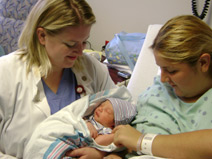 The University of Texas Health Science Center at San Antonio has established the Institute for Integration of Medicine and Science as the home for the Clinical and Translational Science Award. The Institute's mission is to spur integration of clinical and translational research, education, training, and career development across all schools and among partner organizations in South Texas. The Institute will bring existing and newly developing resources and intellectual capital to bear on clinical and translational research for the improvement of human health. Meaningful two-way community participation has promoted buy-in from all stakeholders and will remain a key principle. Institute partners have brought together major talent and a broad array of resources to create synergies that add value to all participating organizations, residents of the region, and the Clinical and Translational Science Award network. Distinctive features of the Institute include: thriving partnerships with key public and private organizations; major investments in research resources and infrastructure; one of the world's largest primate research colonies; the largest cadre of military health care and biomedical research operations in the U.S.; and a 46,000-square-mile service area populated by predominantly Hispanic residents. This area includes some of the country's poorest people and has high rates of health disparities, providing an opportunity, challenge, and obligation for this Institute to make a significant impact on human health.
The University of Texas Health Science Center at San Antonio has established the Institute for Integration of Medicine and Science as the home for the Clinical and Translational Science Award. The Institute's mission is to spur integration of clinical and translational research, education, training, and career development across all schools and among partner organizations in South Texas. The Institute will bring existing and newly developing resources and intellectual capital to bear on clinical and translational research for the improvement of human health. Meaningful two-way community participation has promoted buy-in from all stakeholders and will remain a key principle. Institute partners have brought together major talent and a broad array of resources to create synergies that add value to all participating organizations, residents of the region, and the Clinical and Translational Science Award network. Distinctive features of the Institute include: thriving partnerships with key public and private organizations; major investments in research resources and infrastructure; one of the world's largest primate research colonies; the largest cadre of military health care and biomedical research operations in the U.S.; and a 46,000-square-mile service area populated by predominantly Hispanic residents. This area includes some of the country's poorest people and has high rates of health disparities, providing an opportunity, challenge, and obligation for this Institute to make a significant impact on human health.
The primary vision is to work closely with all partners to translate the results of the academic- and community-based research for the direct benefit of the regional population.
Photo: A medical student at The University of Texas Health Science Center at San Antonio celebrates new life with a mother and baby while on obstetrics rotation at the Regional Academic Health Center, a campus of the Health Science Center in the Lower Rio Grande Valley of Texas. (Photo courtesy of UT Health Science Center San Antonio) Download Hi-Res Photo (3MB JPG)
The University of Utah
Salt Lake City, UT
University of Utah Center for Clinical and Translational Science
Principal Investigator
James P. Kushner, M.D.
Participating Institutions and Community Partners:
- Intermountain Healthcare
- University Health Care
- Veterans Administration Salt Lake City Health Care System
Description:
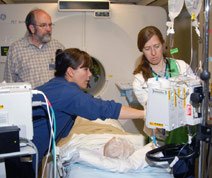 The University of Utah Center for Clinical and Translational Science will build on the University's strengths in genetics and bioinformatics to translate promising bench science into practices that improve human health. The Center will serve as an academic home for clinical and translational research, developing innovative health services for the community and health researchers, providing seed funds to initiate clinical and translational research projects, and training a new generation of clinical and translational investigators.
The University of Utah Center for Clinical and Translational Science will build on the University's strengths in genetics and bioinformatics to translate promising bench science into practices that improve human health. The Center will serve as an academic home for clinical and translational research, developing innovative health services for the community and health researchers, providing seed funds to initiate clinical and translational research projects, and training a new generation of clinical and translational investigators.
The Center and its partners will increase the visibility, volume, and quality of participatory research by connecting investigators at the University with other health care institutions, clinical practitioners, public health personnel, patients, and research participants. As the sole academic health sciences center serving Utah's rapidly growing racial, ethnic, and culturally diverse population, the Center will support the empowerment and representation of underserved populations as stakeholders in translational research.
The Center also will formally link research activities across systems that together provide health care coverage to 80 percent of Utah's population as well as patients in surrounding states.
Photo: Lauren Jones, R.N., assistant nurse manager (front left), Shelley Stanton, R.N., and Donald A. McClain, M.D., Ph.D., of the University of Utah Center for Clinical and Translational Science, prepare a patient for a PET scan as part of a clinical trial. Download Photo (735KB JPG)
2007 Awardees
(The following descriptions are excerpts from the CTSA applications and reflect proposed activities.)
Case Western Reserve University
Cleveland, OH
CTSA at Case Western Reserve University
Principal Investigator
Pamela B Davis, M.D., Ph.D.
Participating Institutions:
- Case Western Reserve University (CWRU), Cleveland, OH
- Cleveland Clinic Lerner College of Medicine (CCLCM) of CWRU, Cleveland, OH
- The Cleveland Clinic Foundation, Cleveland, OH
- University Hospitals Case Medical Center, Cleveland, OH
- MetroHealth Medical Center, Cleveland, OH
Abstract (provided by applicant):
 This CTSA will be based at Case Western Reserve University and will include three of the hospital affiliates of the School of Medicine, the Cleveland Clinic, University Hospitals and MetroHealth Medical Center. Together these hospitals cover 90% of the medical care delivered in the 7-county area surrounding Cleveland, Ohio, offering a wealth of clinical research opportunities. In addition, excellent programs based in the Frances Payne Bolton School of Nursing and the School of Dental Medicine, as well as those in the School of Medicine and its hospital affiliates reach into the community at many sites, some of which will become study sites in the CTSA. Together with the strong biomedical cores, the reach of these programs affords great opportunity for collaborative clinical research.
This CTSA will be based at Case Western Reserve University and will include three of the hospital affiliates of the School of Medicine, the Cleveland Clinic, University Hospitals and MetroHealth Medical Center. Together these hospitals cover 90% of the medical care delivered in the 7-county area surrounding Cleveland, Ohio, offering a wealth of clinical research opportunities. In addition, excellent programs based in the Frances Payne Bolton School of Nursing and the School of Dental Medicine, as well as those in the School of Medicine and its hospital affiliates reach into the community at many sites, some of which will become study sites in the CTSA. Together with the strong biomedical cores, the reach of these programs affords great opportunity for collaborative clinical research.
Photo: Case Western Reserve University faculty and students have the opportunity to work collaboratively in research and academic with nearby institutions that are partners in the CTSA, including the Cleveland Clinic, MetroHealth Medical Center, and University Hospitals. (Photo courtesy of Case Western Reserve University) Download Hi-Res Photo (1.7MB JPG)
Emory University
Atlanta, GA
Atlanta Clinical and Translational Science Institute (Atlanta-CTSI)
Principal Investigator
David S. Stephens, M.D.
Participating Institutions:
- Emory University, Atlanta, GA
- Morehouse School of Medicine, Atlanta, GA
- Georgia Institute of Technology, Atlanta, GA
- Children's Healthcare of Atlanta, Atlanta, GA
- Georgia Research Alliance, Atlanta, GA
- Kaiser Permanente, Atlanta, GA
- Georgia Bio (formerly Georgia Biomedical Partnership), Atlanta, GA
- Atlanta Veterans Affairs Medical Center, Decatur, GA
- Centers for Disease Control and Prevention, Atlanta, GA
- Grady Memorial Hospital and Health System, Atlanta, GA
- The Robert W. Woodruff Health Sciences Center, Atlanta, GA
- Emory University School of Medicine
- Rollins School of Public Health
- Nell Hodgson Woodruff School of Nursing
- Yerkes National Primate Research Center
- Emory Healthcare
- Emory University Hospital
- Emory Crawford Long Hospital
- Wesley Woods Geriatric Center
- The Emory Clinic
- Winship Cancer Institute
Abstract (provided by applicant):
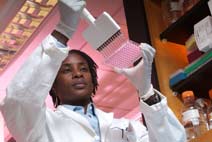
The Atlanta Clinical and Translational Science Institute (Atlanta-CTSI) is led by Emory University, along with partners Morehouse School of Medicine, Georgia Institute of Technology, and Children's Healthcare of Atlanta. These institutions are already partners in healthcare, education, and cutting-edge, interdisciplinary research that will be propelled by the Atlanta-CTSI.
The established partnerships and diverse faculty enable the Atlanta-CTSI to combine strong clinical, translational, training and basic discovery programs at Emory with the health disparities, training and community outreach focus of Morehouse School of Medicine together with the engineering and bioinformatics achievements of Georgia Tech and the excellence in pediatrics of Children's Healthcare of Atlanta. Collaborations with the private non-profit Georgia Bio organization and the Georgia Research Alliance, the state-sponsored academic-industry partnership, create additional synergies that foster and accelerate development and application of new and emerging technologies. Finally the Atlanta-CTSI creates dynamic community, public health, informatics, and population studies programs through partnerships and collaborations with Kaiser Permanente of Georgia (KPGA), the Centers for Disease Control and Prevention, and the Atlanta Veterans Affairs Medical Center.
Photo: Nana Gletsu Miller, Ph.D., is an assistant professor in the Department of Surgery at Emory University School of Medicine. Her research program studies patients undergoing weight loss and the effects of excess adipose tissue on obesity-related diseases. She is performing an ELISA assay to measure concentrations of adipose tissue cytokines in plasma samples obtained from these patients. (Photo courtesy of Emory University) Download Photo (1.9MB JPG)
Johns Hopkins University
Baltimore, MD
Johns Hopkins Institute for Clinical and Translational Research
Principal Investigator
Daniel E. Ford, M.D., M.P.H.
Participating Institutions:
- Johns Hopkins University, Baltimore, MD
- Johns Hopkins Hospital, Baltimore, MD
- Johns Hopkins Bayview Hospital, Baltimore, MD
Abstract (provided by applicant):
 The new Johns Hopkins Institute for Clinical and Translational Research will synergize many existing translational research efforts across the Johns Hopkins Schools of Engineering, Medicine, Nursing, and Public Health. The Institute will create new opportunities to partner with patient communities and for profit organizations that are dedicated to moving new medical interventions into practice. Incorporating new partners for clinical research among community hospitals and primary care organizations will also be a priority. The Institute will provide comprehensive training programs for clinical and translational research that will be targeted for the full range of learners. Clinical and translational researchers will be supported by new programs in biostatistics; innovative methodology; patient recruitment; navigating through regulatory offices; clinical research management systems; bioinformatics; data safety and monitoring programs; building community bridges; research ethics consultations; and the Accelerated Translational Incubator Program (pilot program). New translational cores in drug, device and vaccine development, proteomics, genetics, and imaging will create new translational research teams. Basic science and translational science forums will be utilized to create and support new research teams that span the translational pathway.
The new Johns Hopkins Institute for Clinical and Translational Research will synergize many existing translational research efforts across the Johns Hopkins Schools of Engineering, Medicine, Nursing, and Public Health. The Institute will create new opportunities to partner with patient communities and for profit organizations that are dedicated to moving new medical interventions into practice. Incorporating new partners for clinical research among community hospitals and primary care organizations will also be a priority. The Institute will provide comprehensive training programs for clinical and translational research that will be targeted for the full range of learners. Clinical and translational researchers will be supported by new programs in biostatistics; innovative methodology; patient recruitment; navigating through regulatory offices; clinical research management systems; bioinformatics; data safety and monitoring programs; building community bridges; research ethics consultations; and the Accelerated Translational Incubator Program (pilot program). New translational cores in drug, device and vaccine development, proteomics, genetics, and imaging will create new translational research teams. Basic science and translational science forums will be utilized to create and support new research teams that span the translational pathway.
(Photo courtesy of Johns Hopkins University) Download Photo (2.2MB JPG)
University of Chicago
Chicago, IL
University of Chicago CTSA
Principal Investigator
Julian Solway, M.D.
Participating Institutions:
- The University of Chicago, Chicago, IL
- Argonne National Laboratory (ANL), Argonne, IL
- Illinois Institute of Technology (IIT), Chicago, IL
- University of Chicago Medical Center, Chicago, IL
- Access Community Health Network, Chicago, IL
- Advocate Health Care, Chicago, IL
- Additional University of Chicago Participating Divisions
- Biological Sciences Division
- Physical Sciences Division
- Division of Social Sciences
- School of Social Service Administration
- Additional University of Chicago Centers
- Center for Health and the Social Sciences
- Institute for Molecular Pediatric Science
- MacLean Center for Clinical Medical Ethics
- University of Chicago Cancer Research Center
- Institute for Genomics and Systems Biology
- Institute for Biophysical Dynamics
- Center for Interdisciplinary Health Disparities Research
- Computation Institute
Abstract (provided by applicant):
The ultimate goals of the University of Chicago CTSA program are : 1) to train scientists and health care providers at the University, partner institutions, and community to determine the molecular underpinnings of disease and disease predisposition in any individual patient; 2) to develop, test, implement, and make readily available to community residents personalized therapies directed toward those individual underpinnings; and 3) to do this in a way that is rigorous, valid, efficient, ethical, and respectful of our community's needs and values. In a robust alliance with ANL, IIT, and two large health care organizations, the UC CTSA will undertake three bold new steps that will transform clinical and translational research: 1) Creation of an Institute for Translational Medicine, a new University-wide structure to collect, integrate, and disseminate the intellectual, organizational, and resource infrastructure needed to promote and support multidisciplinary translational research collaborations; 2) Synergistic research interaction with a new Urban Health Initiative which, through partnership with community stakeholders, aims to improve community health care access and quality, to build health literacy and trust throughout the community, to enhance a translational research program informed by and responsive to the needs of the community, and so to reduce health disparities; and 3) Establishment of a new academic Committee on Clinical and Translational Science and of multiple novel training programs to encourage and develop careers in clinical and translational research, intended for high school students through university faculty and across the entire translational research spectrum. CTSA investigators will employ a systems medicine approach to leverage their particular expertise in social science, genetic medicine, and integrative therapeutics.
University of Iowa
Iowa City, IA
University of Iowa's Institute for Clinical and Translational Science
Principal Investigator
Gary W Hunninghake, M.D.
Participating Institutions:
- University of Iowa, Iowa City, IA
Abstract (provided by applicant):
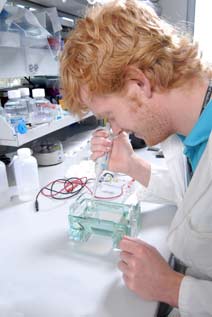 The University of Iowa's Institute for Clinical and Translational Science includes 39 established University centers and institutes representing all 11 UI colleges. Examples include the UI Hospitals and Clinics' General Clinical Research Center; the Holden Comprehensive Cancer Center at the UI; the Law, Health Policy, and Disability Center; the Prairielands Addiction Technology Transfer Center; the Northern Plains Native American Health Disparities Center; and the Upper Midwest Public Health Training Center. Partnerships with the University of Arizona and Iowa State University add richness and diversity to the Institute's efforts. The Institute will energize strong UI research programs in areas like optical science, oral and maxillofacial implants, nanotechnology, and advanced imaging, and nurture newer initiatives like community-based research. The Institute's statewide network of community practitioners, hospitals, and health organizations will help identify areas for further study, improve public perception of clinical research, and make cutting-edge research, discoveries and treatments available to patients wherever they live. Looking even further ahead, the Institute's masters and Ph.D. degree programs in clinical and translational science will prepare tomorrow's researchers. CTSA support will advance research at the UI in innumerable ways.
The University of Iowa's Institute for Clinical and Translational Science includes 39 established University centers and institutes representing all 11 UI colleges. Examples include the UI Hospitals and Clinics' General Clinical Research Center; the Holden Comprehensive Cancer Center at the UI; the Law, Health Policy, and Disability Center; the Prairielands Addiction Technology Transfer Center; the Northern Plains Native American Health Disparities Center; and the Upper Midwest Public Health Training Center. Partnerships with the University of Arizona and Iowa State University add richness and diversity to the Institute's efforts. The Institute will energize strong UI research programs in areas like optical science, oral and maxillofacial implants, nanotechnology, and advanced imaging, and nurture newer initiatives like community-based research. The Institute's statewide network of community practitioners, hospitals, and health organizations will help identify areas for further study, improve public perception of clinical research, and make cutting-edge research, discoveries and treatments available to patients wherever they live. Looking even further ahead, the Institute's masters and Ph.D. degree programs in clinical and translational science will prepare tomorrow's researchers. CTSA support will advance research at the UI in innumerable ways.
Photo: Michael Hildebrand studying gene therapies for hearing loss. (Photo courtesy of University of Iowa) - Download Photo (493KB JPG)
University of Michigan
Ann Arbor, MI
Michigan Institute of Clinical and Health Research
Principal Investigator
Daniel J Clauw, M.D.
Participating Institutions:
- University of Michigan at Ann Arbor, Ann Arbor, MI
- Michigan State University, East Lansing, MI
Abstract (provided by applicant):
 The Michigan Institute of Clinical and Health Research creates partnerships among the relevant units of the University, the NIH, external industry partners, and the community. The overwhelming majority of UM schools, colleges, and institutes are participating, including: the top-ranked Schools of Business, Dentistry, Medicine, Nursing, Social Work, and Public Health; the Colleges of Engineering, Pharmacy, Literature, and Science and Arts; the Division of Kinesiology; the Institute of Social Research; and the Life Sciences Institute. The University-owned Health System, which includes integrated outpatient and inpatient facilities, is contributing significantly to a strong partnership with the UM CTSA site. In addition to the grant resources, the institution is contributing substantial in-kind support, cost-sharing, support of pilot and recruitment programs, and renovation costs, a more than 1:1 match of NIH dollars. The University of Michigan CTSA program includes an Education Program that reaches a wide spectrum of audiences: from undergraduates to mid-career faculty, from basic scientists to population researchers, from staff to community members.
The Michigan Institute of Clinical and Health Research creates partnerships among the relevant units of the University, the NIH, external industry partners, and the community. The overwhelming majority of UM schools, colleges, and institutes are participating, including: the top-ranked Schools of Business, Dentistry, Medicine, Nursing, Social Work, and Public Health; the Colleges of Engineering, Pharmacy, Literature, and Science and Arts; the Division of Kinesiology; the Institute of Social Research; and the Life Sciences Institute. The University-owned Health System, which includes integrated outpatient and inpatient facilities, is contributing significantly to a strong partnership with the UM CTSA site. In addition to the grant resources, the institution is contributing substantial in-kind support, cost-sharing, support of pilot and recruitment programs, and renovation costs, a more than 1:1 match of NIH dollars. The University of Michigan CTSA program includes an Education Program that reaches a wide spectrum of audiences: from undergraduates to mid-career faculty, from basic scientists to population researchers, from staff to community members.
Photo: Basic and clinical researchers in the Allergy and Clinical Immunology Division at the University of Michigan Medical School form collaborative relationships with other units to speed discoveries to patients. (Photo courtesy of University of Michigan) - Download Hi-Res (1.1MB JPG) Photo
University of Texas Southwestern Medical Center
Dallas, TX
North and Central Texas Clinical and Translational Science Initiative
Principal Investigator
Milton Packer, M.D.
Participating Institutions:
- University of Texas Southwestern Medical Center/Dallas, Dallas, TX
Abstract (provided by applicant):
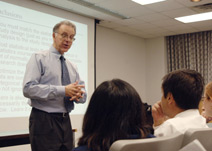 The North and Central Texas Clinical and Translational Science Initiative will be led by the University of Texas Southwestern Medical School at Dallas and will include schools of allopathic and osteopathic medicine, dentistry, nursing, pharmacy, public health, engineering and computer science, which have already formed relationships supported by a Roadmap K12 award. A new Department of Clinical Sciences, which is supported by faculty from all participating schools, will serve as the academic home for the CTSA site. Existing infrastructure and support include: a substantial financial commitment of participating institutions to the Initiative; more than 200 established clinical and translational investigators who will act as faculty and mentors; and a large and medically diverse patient base cared for by established hospitals.
The North and Central Texas Clinical and Translational Science Initiative will be led by the University of Texas Southwestern Medical School at Dallas and will include schools of allopathic and osteopathic medicine, dentistry, nursing, pharmacy, public health, engineering and computer science, which have already formed relationships supported by a Roadmap K12 award. A new Department of Clinical Sciences, which is supported by faculty from all participating schools, will serve as the academic home for the CTSA site. Existing infrastructure and support include: a substantial financial commitment of participating institutions to the Initiative; more than 200 established clinical and translational investigators who will act as faculty and mentors; and a large and medically diverse patient base cared for by established hospitals.
Photo: Dr. Milton Packer, chairman of clinical sciences at UT Southwestern Medical Center, is principal investigator for the UT Southwestern-led North and Central Texas Clinical and Translational Science Initiative. (Photo courtesy of UT Southwestern Medical Center) Download Hi-Res Photo (1.7MB JPG)
University of Washington
Seattle, WA
Institute of Translational Health Sciences
Principal Investigator
Mary (Nora) L. Disis, M.D.
Participating Institutions:
- University of Washington, Seattle, WA
- Children's Hospital and Regional Medical Center, Seattle, WA
- Fred Hutchinson Cancer Research Center/Seattle Cancer Care Alliance, Seattle, WA
- Group Health Cooperative Center for Health Studies, Seattle, WA
- Benaroya Research Institute at Virginia Mason, Seattle, WA
- Northwest Association for Biomedical Research, Seattle, WA
Proposed American Indian and Alaska Native Network Sites:
- Seattle Indian Health Board, Seattle WA
- N.A.T.I.V.E. Project, Spokane, WA
- South Puget Intertribal Planning Agency, Shelton, WA
- Alaska Native Tribal Health Consortium, Anchorage, AK
- Northwest Portland Area Indian Health Board, Portland, OR
- Montana-Wyoming Tribal Leaders Council, Billings, MT
Abstract (provided by applicant):
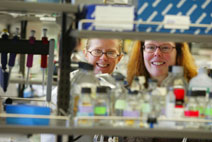 The Institute of Translational Health Sciences represents a consortium of six University of Washington (UW) health science professional schools with multiple partners that cover 12 performance sites, involve 67 scientific key personnel and connect researchers to over 150 centers. In addition, the Institute of Translational Health Sciences proposes to integrate major research and clinical institutions across a five-state region: Washington, Wyoming, Alaska, Montana, and Idaho (WWAMI) via ongoing clinical and research collaboration pathways that are part of the WWAMI program led by the UW School of Medicine.
The Institute of Translational Health Sciences represents a consortium of six University of Washington (UW) health science professional schools with multiple partners that cover 12 performance sites, involve 67 scientific key personnel and connect researchers to over 150 centers. In addition, the Institute of Translational Health Sciences proposes to integrate major research and clinical institutions across a five-state region: Washington, Wyoming, Alaska, Montana, and Idaho (WWAMI) via ongoing clinical and research collaboration pathways that are part of the WWAMI program led by the UW School of Medicine.
A unique feature of this CTSA site is its community engagement plan which considers diversity across race, ethnicity, culture, rural and urban locations, geography, health status and health service delivery with a targeted program for Alaska Natives and American Indians. The Institute of Translational Health Sciences will support an integrated ethics program linking adult and pediatric medical centers and the community. An additional unique feature is the site's advanced capability for therapeutic product development and clinical testing that will enhance future health care throughout the region. The Institute of Translational Health Sciences will foster new health sciences interactions across the sites through a variety of technology, education, and research support cores. The Institute will guide, support and facilitate translational research efforts that focus on expanded information collection, sharing and analysis, innovative scientific technologies, and critical support services aimed at accelerating health sciences research.
Photo: Dr. Mary "Nora" Disis, right, and researcher Vivian Goodell are conducting research to develop a cancer vaccine that would work like immunizations against infectious diseases. (Photo by Paul Joseph Brown, courtesy of the Seattle Post-Intelligencer)
University of Wisconsin
Madison, WI
Institute for Clinical and Translational Research (ICTR)
Principal Investigator
Marc K. Drezner, M.D.
Participating Institutions:
- University of Wisconsin-Madison and its 5 academic partners (Schools of Medicine, Nursing, Pharmacy, and Veterinary Medicine and the College of Engineering), Madison, WI
- University of Wisconsin Hospital and Clinics, Madison, WI
- American Family Children's Hospital, Madison, WI
- William S. Middleton Veterans Administration Hospital, Madison, WI
- UW-Madison Interdisciplinary Research Complex, Madison, WI
- UW-Madison HealthEmotions Research Institute, Research Park Psychiatry, Madison, WI
- Waisman Center at UW-Madison, Madison, WI
- UW Academic Campus at Aurora Sinai Medical Center CTRC satellite (hospital & outpatient), Milwaukee, WI
- UW Academic Campus at Marshfield Clinic CTRC Satellite, Marshfield, WI
- St. Joseph's Hospital CTRC Satellite, Marshfield, WI
- Wisconsin Network for Health Research at:
- Gundersen Lutheran Clinic, La Crosse, WI
- Marshfield Clinic, Marshfield, WI
- Aurora Healthcare, Milwaukee, WI
- UW and its Wisconsin Research and Education Network affiliated practices in WI; the Wisconsin Oncology Network affiliated practices, and the Pediatric Practice-Based Research Network affiliated practices in Wisconsin
- Meriter Hospital, Madison, WI
Abstract (provided by applicant):
The University of Wisconsin-Madison, through its new Institute for Clinical and Translational Research (ICTR), will address how to translate biomedical discoveries into practices that improve health. The ICTR will take a new approach to research by producing interdisciplinary research scientists who can address health problems along a continuum--from basic laboratory investigations through clinical trials in patients and into population health studies in communities. The Institute will provide researchers an array of tools and will create feedback systems to ensure that research is relevant and addresses the health care needs of populations in Wisconsin.
The Institute will be the hub of a network that fans across the university and extends around the state. People based at five schools on campus and several hospitals in Madison will be involved as will experts at academic campuses on all points of the Badger State compass. New and existing statewide partnerships will be enhanced. Physicians and public health workers in towns and communities throughout the state will be essential players.
Vanderbilt University
Nashville, TN
Vanderbilt Institute for Clinical and Translational Research (VICTR)
Principal Investigator
Gordon R. Bernard, M.D.
Participating Institutions:
- Vanderbilt University, Nashville, TN
- Meharry Medical College, Nashville, TN
Abstract (provided by applicant):
 The Vanderbilt Institute for Clinical and Translational Research (VICTR) will be created to focus on both bench-to-bedside, and bedside-to-practice translation. Vanderbilt intends to remove impediments and release investigators from administrative burdens, produce inspired personnel trained in the bi-directional process of translational research, foster innovation by stimulating contributions from collaborators, and enrich the translational research environment with extensive state-of-the art informatics tools as well as expert biostatistics support. The proposed institute will leverage Vanderbilt's existing NIH-funded General Clinical Research Center (GCRC), which has been an established center generating clinical research for 50 years. The funds will also be used to establish a Community Engagement and Research program, which leverages the very strong ties of Vanderbilt to the community. Important to the overall success of the program is a focused partnership with Meharry Medical College. Also involved within Vanderbilt is the Institute for Medicine and Public Health as well as the Schools of Medicine, Nursing, Law, Business, Engineering, Peabody College of Education and Human Development, the College of Arts and Sciences, and the Kennedy Center for Research on Human Development.
The Vanderbilt Institute for Clinical and Translational Research (VICTR) will be created to focus on both bench-to-bedside, and bedside-to-practice translation. Vanderbilt intends to remove impediments and release investigators from administrative burdens, produce inspired personnel trained in the bi-directional process of translational research, foster innovation by stimulating contributions from collaborators, and enrich the translational research environment with extensive state-of-the art informatics tools as well as expert biostatistics support. The proposed institute will leverage Vanderbilt's existing NIH-funded General Clinical Research Center (GCRC), which has been an established center generating clinical research for 50 years. The funds will also be used to establish a Community Engagement and Research program, which leverages the very strong ties of Vanderbilt to the community. Important to the overall success of the program is a focused partnership with Meharry Medical College. Also involved within Vanderbilt is the Institute for Medicine and Public Health as well as the Schools of Medicine, Nursing, Law, Business, Engineering, Peabody College of Education and Human Development, the College of Arts and Sciences, and the Kennedy Center for Research on Human Development.
Photo: Sandy Yoder, a senior research specialist, works in Vanderbilt University Medical Center's Pediatric Infectious Diseases Lab. She uses liquid nitrogen to keep vials at 320 degrees below zero. Yoder is putting away influenza samples obtained in vaccine trials at Vanderbilt. (Photo courtesy of Vanderbilt University) - Download Hi-Res (623KB JPG) Photo
Washington University
St. Louis, MO
CTSA at Washington University
Principal Investigator
Kenneth S. Polonsky, M.D.
Participating Institutions:
- Washington University, St. Louis, MO
- Children's Hospital of St. Louis, St. Louis, MO
- Barnes-Jewish Hospital, St. Louis, MO
- Saint Louis University, St. Louis, MO
- St. Louis College of Pharmacy, St. Louis, MO
- Southern Illinois University Edwardsville School of Nursing, Edwardsville, IL
- University of Missouri at St. Louis College of Nursing, St. Louis, MO
Abstract (provided by applicant):
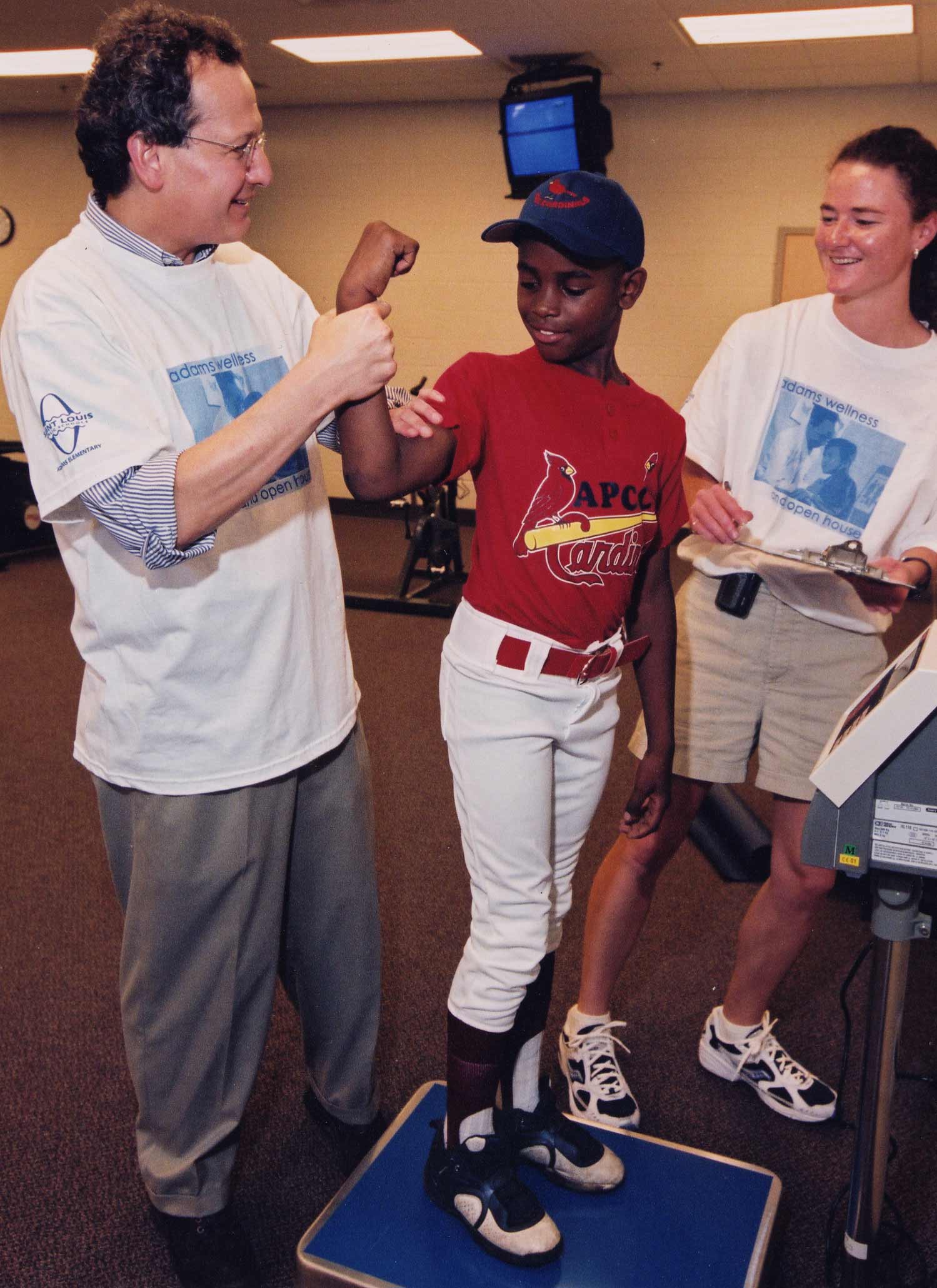 The CTSA at Washington University (WU) in St. Louis will be implemented by creating a new Institute of Clinical and Translational Sciences designed to conceptually and operationally reinvent and reinvigorate clinical and translational research and research training. The Institute incorporates existing programs (GCRC, K12, K30, and T32) and WU's new BioMed 21 strategic initiative in multidisciplinary, collaborative research in genome sciences, biological imaging, and clinical investigation. It also involves an unprecedented level of partnership with other academic, health care, community and scientific institutions in the St. Louis area. Partners include BJC HealthCare; Saint Louis University School of Public Health, Graduate School and Doisy College of Health Sciences; University of Missouri St. Louis College of Nursing; Southern Illinois University Edwardsville School of Nursing; and St. Louis College of Pharmacy; key organizations promoting community health as well as biomedical and pharmaceutical companies in the St. Louis area. The Institute of Clinical and Translational Sciences will oversee 15 key programs, each designated to facilitate the safe and ethical conduct of research in humans.
The CTSA at Washington University (WU) in St. Louis will be implemented by creating a new Institute of Clinical and Translational Sciences designed to conceptually and operationally reinvent and reinvigorate clinical and translational research and research training. The Institute incorporates existing programs (GCRC, K12, K30, and T32) and WU's new BioMed 21 strategic initiative in multidisciplinary, collaborative research in genome sciences, biological imaging, and clinical investigation. It also involves an unprecedented level of partnership with other academic, health care, community and scientific institutions in the St. Louis area. Partners include BJC HealthCare; Saint Louis University School of Public Health, Graduate School and Doisy College of Health Sciences; University of Missouri St. Louis College of Nursing; Southern Illinois University Edwardsville School of Nursing; and St. Louis College of Pharmacy; key organizations promoting community health as well as biomedical and pharmaceutical companies in the St. Louis area. The Institute of Clinical and Translational Sciences will oversee 15 key programs, each designated to facilitate the safe and ethical conduct of research in humans.
Photo: Samuel Klein, M.D., professor of medicine, and Jennifer McCrea, research coordinator, offer health and nutrition tips to 10 year old Van Carter at the Adams Park Elementary School Wellness Fair. Dr. Klein will be the director of the CTSA Clinical Interactions Resources Core at the Washington University Institute of Clinical and Translational Sciences. (Photo courtesy of Washington University) - Download Hi-Res (3.3MB JPG) Photo
Weill Cornell Medical College
New York, NY
CTSA at Weill Cornell Medical College
Principal Investigator
Julianne L. Imperato-McGinley, M.D.
Participating Institutions:
- Weill Cornell Medical College (WCMC), New York, NY
- Weill Cornell Graduate School of Medical Sciences
- Cornell University, New York, NY
- Cornell University Cooperative Extension in New York City (CUCE-NYC)
- Hospital for Special Surgery (HSS), New York, NY
- Hunter College, City University of New York
- Hunter College Research Center for Minority Institutions (RCMI), Center for the Study of Gene Structure and Function
- Hunter College School of Nursing
- Memorial Sloan-Kettering Cancer Center (MSKCC), New York, NY
- New York-Presbyterian Hospital, Weill Cornell Campus
- Weill Cornell-affiliated hospitals
Abstract (provided by applicant):
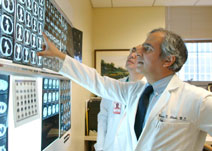 The Clinical and Translational Science Center (CTSC) - comprising public/private institutions on the Upper East Side of Manhattan - is a unique and diverse biomedical complex, providing investigators with state-of-the-art resources for conducting clinical/translational research.
The Clinical and Translational Science Center (CTSC) - comprising public/private institutions on the Upper East Side of Manhattan - is a unique and diverse biomedical complex, providing investigators with state-of-the-art resources for conducting clinical/translational research.
Weill Cornell Medical College of Cornell University, the lead institution, serves as conduit through which technological resources and educational programs are efficiently shared and managed. Neighboring institutions contribute significantly to the CTSC. Hospital for Special Surgery, a leader in investigating musculoskeletal and autoimmune diseases, is one of two medical institutions designated by NIH as a Core Center for Skeletal Integrity. Memorial Sloan-Kettering Cancer Center is a cancer center where state-of-the-art basic science research flourishes side-by-side with clinical investigation and treatment at Memorial Hospital. Cornell University Cooperative Extension, NYC, engaged in research addressing the needs of a changing New York for over fifty years, will be the linchpin for community outreach. Hunter College Gene Center's Research Center for Minority Institutions recruits and nurtures minority talent and has established an effective electronic network with minority scientists nationwide. Hunter College School of Nursing, training nurses from a diverse urban population, will participate in community outreach and education in underserved areas.
Photo: Dr. Nasser Altorki, director of the Division of Thoracic Surgery at New York-Presbyterian Hospital/Weill Cornell Medical Center, confers with a colleague about a CT scan of a patient's chest. (Photo courtesy of Weill Cornell Medical College) - Download Hi-Res Photo (215KB JPG)
2006 Awardees
Columbia University Health Sciences
New York, NY
Irving Institute for Clinical and Translational Research (IICTR)
Principal Investigator
Henry Ginsberg, M.D.
Abstract (provided by applicant):
 Columbia University Medical Center's (CUMC) CTSA program will transform the culture of clinical and translational research so that CUMC can develop and retain an outstanding cadre of senior faculty to lead the next generation of clinical and translational investigators. With enhanced support from the CUMC-Herbert Irving Endowment, which will increase from its present level of $15 million to $25 million, CUMC will accomplish this goal by creating the Irving Institute for Clinical and Translational Research (IICTR). The IICTR will be the academic and intellectual home for the next generation of clinical and translational investigators. The senior faculty will provide leadership and stature for the IICTR, and serve as mentors for both the junior faculty and IICTR trainees. The junior faculty, called Irving Fellows, will work with senior faculty to develop novel approaches to advancing multi- and interdisciplinary clinical and translational research. The Irving Fellows will be role models for the way multi- and interdisciplinary research should be conducted at CUMC. The resources provided by IICTR will include outstanding support and research in biomedical informatics, biostatistical and clinical trial design, bioethics, regulatory issues, patient-oriented research, and core laboratory resources. The Irving Fellows will be supported by CUMC and the CTSA, as will pilot and collaborative research grants awarded annually by the IICTR. CUMC has invested in the development of new space for the IICTR, including space for pediatric inpatient/outpatient research and the Center for Clinically Oriented Research Education that will be a home for trainees and faculty. CUMC will also develop a new off-campus research center to support community-based clinical and translational research, and education. As part of the CTSA program, CUMC has created an integrated educational program that includes a new multidisciplinary, patient-oriented research master's degree, a novel K12 scholars mentored research program in muti- and interdisciplinary research, and a pioneering multidisciplinary, patient-oriented research Ph.D. program. The goal of the IICTR and CTSA is to enable more direct utilization of research advances to benefit patients and the community.
Columbia University Medical Center's (CUMC) CTSA program will transform the culture of clinical and translational research so that CUMC can develop and retain an outstanding cadre of senior faculty to lead the next generation of clinical and translational investigators. With enhanced support from the CUMC-Herbert Irving Endowment, which will increase from its present level of $15 million to $25 million, CUMC will accomplish this goal by creating the Irving Institute for Clinical and Translational Research (IICTR). The IICTR will be the academic and intellectual home for the next generation of clinical and translational investigators. The senior faculty will provide leadership and stature for the IICTR, and serve as mentors for both the junior faculty and IICTR trainees. The junior faculty, called Irving Fellows, will work with senior faculty to develop novel approaches to advancing multi- and interdisciplinary clinical and translational research. The Irving Fellows will be role models for the way multi- and interdisciplinary research should be conducted at CUMC. The resources provided by IICTR will include outstanding support and research in biomedical informatics, biostatistical and clinical trial design, bioethics, regulatory issues, patient-oriented research, and core laboratory resources. The Irving Fellows will be supported by CUMC and the CTSA, as will pilot and collaborative research grants awarded annually by the IICTR. CUMC has invested in the development of new space for the IICTR, including space for pediatric inpatient/outpatient research and the Center for Clinically Oriented Research Education that will be a home for trainees and faculty. CUMC will also develop a new off-campus research center to support community-based clinical and translational research, and education. As part of the CTSA program, CUMC has created an integrated educational program that includes a new multidisciplinary, patient-oriented research master's degree, a novel K12 scholars mentored research program in muti- and interdisciplinary research, and a pioneering multidisciplinary, patient-oriented research Ph.D. program. The goal of the IICTR and CTSA is to enable more direct utilization of research advances to benefit patients and the community.
Photo: The CTSA grant will support clinical and translational research at Columbia University Medical Center, such as Dr. Howard Kaufman's research on tumor immunology and cancer vaccines.
(Photo courtesy of Columbia University Medical Center) Download Hi-Res Photo (1MB JPG)
Duke University
Durham, NC
Clinical Translational Science Institute (CTSI)
Principal Investigator
Robert M. Califf, M.D.
E-mail:
calif001@mc.duke.edu
Abstract (provided by applicant):
 Duke University proposes to create a Clinical Translational Science Institute (CTSI). This institute will accomplish four specific aims: 1) create an institute that will transform how fundamental discoveries are translated into improved medical care by supporting creative translational research teams. The institute will provide leadership and resources for original translational and clinical research, and it will develop and perform studies regarding novel methods and approaches to translational and clinical science; 2) create an environment in which trainees at all levels, including medical and nursing school students, physical therapists, pharmacologists, house staff, fellows, graduate students, junior faculty, and career transition faculty can be trained in translational and clinical research. The training will be built on the principle that a rich clinical and translational research environment will provide Duke University trainees with models and opportunities for success; 3) integrate translational and clinical science by fostering collaboration among Duke University's departments, institutes, centers, and schools, using human resources supported by modern bioinformatics and a new clinical research unit designed to integrate intensive measurements of biological processes; 4) and develop a community model for understanding how to translate the findings of research from bench to bedside, to populations using advanced informatics and health services delivery methods. The Duke University CTSI will be founded on three entities, or pillars, including Duke University Translational Research Institute (DTRI), Duke University Clinical Research Institute (DCRI), and Duke University Center for Community Research (DCCR). These three entities will bring together and expand existing programs, and will be designed to emphasize the continuities along the spectrum of research that begins in a basic science laboratory and concludes with novel therapies that change outcomes for individual patients. These three pillars—DCRI, DTRI, and DCCR—will be administratively joined into the new Duke University Clinical and Translational Science Institute (Duke University CTSI), the core of this application. This new institute will link with other key programs, including Duke University Comprehensive Cancer Center, Duke University School of Nursing, and Duke University Institute for Genome Sciences and Policy, to create a comprehensive home for clinical and translational researchers. The creation of the CTSI is relevant to public health as it will create an environment that will foster speedier delivery of new interventions and healthcare practices to the community.
Duke University proposes to create a Clinical Translational Science Institute (CTSI). This institute will accomplish four specific aims: 1) create an institute that will transform how fundamental discoveries are translated into improved medical care by supporting creative translational research teams. The institute will provide leadership and resources for original translational and clinical research, and it will develop and perform studies regarding novel methods and approaches to translational and clinical science; 2) create an environment in which trainees at all levels, including medical and nursing school students, physical therapists, pharmacologists, house staff, fellows, graduate students, junior faculty, and career transition faculty can be trained in translational and clinical research. The training will be built on the principle that a rich clinical and translational research environment will provide Duke University trainees with models and opportunities for success; 3) integrate translational and clinical science by fostering collaboration among Duke University's departments, institutes, centers, and schools, using human resources supported by modern bioinformatics and a new clinical research unit designed to integrate intensive measurements of biological processes; 4) and develop a community model for understanding how to translate the findings of research from bench to bedside, to populations using advanced informatics and health services delivery methods. The Duke University CTSI will be founded on three entities, or pillars, including Duke University Translational Research Institute (DTRI), Duke University Clinical Research Institute (DCRI), and Duke University Center for Community Research (DCCR). These three entities will bring together and expand existing programs, and will be designed to emphasize the continuities along the spectrum of research that begins in a basic science laboratory and concludes with novel therapies that change outcomes for individual patients. These three pillars—DCRI, DTRI, and DCCR—will be administratively joined into the new Duke University Clinical and Translational Science Institute (Duke University CTSI), the core of this application. This new institute will link with other key programs, including Duke University Comprehensive Cancer Center, Duke University School of Nursing, and Duke University Institute for Genome Sciences and Policy, to create a comprehensive home for clinical and translational researchers. The creation of the CTSI is relevant to public health as it will create an environment that will foster speedier delivery of new interventions and healthcare practices to the community.
Photo: Scientists at Duke University Medical Center (Martin Tornai, Ph.D. shown here) have created a new breast scanner that will dramatically improve their ability to visualize small tumors while also reducing radiation exposure to one-tenth that of normal mammograms. Moreover, the new device does not compress the breast, as do traditional mammograms.
(Photo courtesy of Duke University Medical Center) Download Photo (16KB JPG)
Mayo Clinic College of Medicine
Rochester, MN
Center for Clinical and Translational Research (CCTR)
Principal Investigator
Robert A. Rizza, M.D.
Abstract (provided by applicant):
The goal of the Mayo Clinic CTSA application is to present Mayo's vision for the integration and expansion of our innovative clinical and translational research activities, so that a highly functional academic home for clinical and translational research is developed at the Mayo Clinic. This new Center for Clinical and Translational Research (CCTR) will be founded on Mayo Clinic's long-standing excellence in and commitment to clinical and translational research, which includes the support of key infrastructure and a commitment to career development. To achieve this goal, Mayo will take a comprehensive approach to the key elements of the CTSA RFA and focus on enhancing: 1) clinical research core resources that provide innovative tools to investigators; 2) career development and education programs that prepare the next generation of investigators; 3) compliance and regulatory affairs support that ensures patient safety and privacy, and customer service-oriented approaches to support investigative teams; 4) community affairs support to enhance participation, diversity and community support for clinical and translational research; 5) collaboration with industry and clinical practices to translate research discoveries into routine clinical practice; and 6) continued and expanded institutional support that includes an "academic home" for clinical and translational research. Mayo Clinic also proposes a consolidated governance plan that incorporates strong data-driven evaluation of each CCTR element and the program as a whole. In principle, the CTSA program is consistent with the historical, conceptual, and philosophical underpinnings of Mayo Clinic, and this application clearly articulates how the overarching and transformative goals of the CTSA program can be met at Mayo. Additionally, the CCTR has the "institutional will" and is culturally empowered to execute this plan. Thus, Mayo is ready to implement the CTSA program aggressively and rapidly; the Mayo Clinic CCTR will be a highly functional and successful "flagship" site for the CTSA program as it emerges from the NIH Roadmap. To summarize, the Mayo Clinic Center for Clinical and Translational Research (CCTR) will bring together all the resources of the five schools within the Mayo Clinic College of Medicine, and more than 100 years of scientific and medical research expertise, to discover innovative new methods that will speed the translation of research results into therapies, tools, and patient care practices that impact all members of the local and national communities. This vision is entirely consistent with the stated mission of the Mayo Clinic to provide the best care to every patient, every day, through integrated clinical practice, education, and research.
Oregon Health & Science University
Portland, OR
Oregon Clinical and Translational Science Institute (OCTSI)
Principal Investigator
Eric Orwoll, M.D.
E-mail:
orwoll@ohsu.edu
Abstract (provided by applicant):
Biomedical research institutions in Oregon are outstanding, and are prepared for a major expansion in clinical/translational investigation. The university proposes to form the Oregon Clinical and Translational Science Institute (OCTSI). The OCTSI will fundamentally change biomedical research to create a vibrant academic home for clinical/translational investigation. It will leverage existing strengths and remove barriers to the pace and growth of research. At the heart of the OCTSI is a robust partnership between Oregon Health & Science University (OHSU) and Kaiser Permanente's Center for Health Research (KPCHR) that brings together a strong biomedical research university and an innovative practice-based research center associated with a large patient population. The collaboration provides unique opportunities for expansion across the spectrum of human investigation, and sets the stage for major advances in human health. Transformation of clinical and translational research in Oregon is enhanced by: robust institutional support for the OCTSI, manifest by significant administrative change as well as the commitment of substantial financial and space resources; academic faculties at OHSU and KPCHR that fully support the OCTSI initiative and the development of a strong, multidisciplinary OCTSI leadership team; merging of resources to form a coordinated infrastructure for clinical/translational research; and strong ties to the community and the involvement of the region in the human research agenda. We have identified three major goals for the OCTSI, and propose far-reaching, explicit, and feasible approaches to achieve them. The university will 1) create an academic home specifically devoted to the discipline of clinical/translational research; 2) nurture a new cadre of highly-trained, interdisciplinary investigators through a strong, diverse educational curriculum; and 3) create a "research commons"—a coordinated infrastructure of core research tools that greatly expands research opportunities and provides a unified, effective means for their access. There are particular opportunities to accelerate progress in pediatric and child health, community based research, and human genetics.
Rockefeller University
New York, NY
Rockefeller University Center for Clinical and Translational Sciences
Principal Investigator
Barry Coller, M.D.
E-mail:
collerb@rockefeller.edu
Abstract (provided by applicant):
The Rockefeller University Hospital, a GCRC awardee since 1963, has been the continuous "home" for clinical and translational science at Rockefeller since 1910. It has been the site of numerous landmark scientific and clinical contributions, and many of its trainees have gone on to become academic leaders. With the new resources available under a Clinical and Translational Science Award (CTSA), a core faculty of distinguished investigators, whose research spans the basic-translational spectrum and encompasses a broad range of scientific and medical disciplines, will integrate and expand Rockefeller University's scientific and educational programs in a new Rockefeller University Center for Clinical and Translational Science. The new center will transform clinical and translational research by encouraging new studies, enhancing and centralizing the support structures required to conduct studies with scientific rigor, and ensuring an absolute commitment to the protection of human subjects and participant safety. The key elements in the transformation will be: 1) a new governance structure reflecting the NIH cooperative agreement (U54) "assistance" mechanism; 2) creation of a new K12 Clinical Research Scholars Program offering master's and Ph.D. level degrees to complement the current Clinical Scholars Program; 3) infrastructure enhancements to facilitate the development and conduct of clinical protocols under the principle of good clinical practice (GCP), including biomedical informatics, biostatistics, bionutrition, research nursing, research pharmacy, participant recruitment and community engagement, and regulatory support and oversight from the clinical research (research subject advocate) support office; and 4) development of innovative and novel core methodologies related to dendritic cell therapy; vaccine development for HIV, hepatitis C, and malignancies; genetics/genomics; assessing the immune response; and metabolic phenotyping. The center will continue Rockefeller's tradition of focusing on the interface between scientific discovery, human pathophysiology, and novel diagnostic, preventive, and therapeutic strategies. It will partner with industry, when mutually beneficial, to achieve these goals. The center will be an active member of the national CTSA consortium, offering the consortium novel ideas and tools for conducting and evaluating clinical and translational research. It will eagerly adopt the best practices identified by the consortium and adhere to the standards set by the consortium.
University of California, Davis
Davis, CA
Clinical and Translational Science Center (CTSC)
Principal Investigator
Lars F. Berglund, M.D., Ph.D.
E-mail:
lars.berglund@ucdmc.ucdavis.edu
Abstract (provided by applicant):
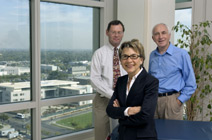 The University of California, Davis (UC Davis) is proposing to create a Clinical and Translational Science Center (CTSC) that will transform its medical research enterprise into a highly effective "open" academic home for clinical and translational research by building on three key assets: 1) a long-standing commitment as a land-grant university to serve the geographically dispersed and ethnically diverse populations of inland and northern California with a health care system enabled by one of the broadest and most extensive telecommunications programs in the world; 2) the collaborative culture of UC Davis, which has one of the most extensive and interdisciplinary life science environments in the country; and 3) an established CTSC pilot facility—the UC Davis Clinical Research Investigator Services Program (CRISP) that serves as the physical home for clinical and translational research, and for faculty training and career development. CRISP is a fundamentally important CTSC testing ground where many perceived CTSC barriers have been explored and solutions have been tested. Through CRISP, UC Davis has completed the planning phase for the CTSC. In the organizational structure of the UC Davis CTSC, considerable attention is paid to create an organization that is: 1) responsive and familiar to investigators; 2) flexible; 3) well linked to university leadership, to participating academic units, and to the community; and 4) focused on the goal of reducing barriers and facilitating the translation of research gains into medical practice. Key features are: an education program focused on "team science;" extensive collaborations across UC Davis colleges and centers; introduction of catalyst functions such as collaborative research facilitators and translational postdoctoral fellowships; dissemination through tele-technology; flexible use of resources for patient-oriented research; and a community engagement program emphasizing trust and respect. The CTSC is under the leadership of two co-principal investigators, Drs. Berglund M.D., Ph.D., (P.I.) and Joseph M.D., Ph.D. (co-P.I.), supported by a team of directors and co-directors that oversees each of the nine CTSC programs, and a comprehensive committee structure, designed to firmly anchor the CTSC with institutional leadership, faculty, trainees, and the community. The UC Davis CTSC will be implemented through a carefully designed, collaborative plan, and the activity will be guided through continuous evaluations and corrections.
The University of California, Davis (UC Davis) is proposing to create a Clinical and Translational Science Center (CTSC) that will transform its medical research enterprise into a highly effective "open" academic home for clinical and translational research by building on three key assets: 1) a long-standing commitment as a land-grant university to serve the geographically dispersed and ethnically diverse populations of inland and northern California with a health care system enabled by one of the broadest and most extensive telecommunications programs in the world; 2) the collaborative culture of UC Davis, which has one of the most extensive and interdisciplinary life science environments in the country; and 3) an established CTSC pilot facility—the UC Davis Clinical Research Investigator Services Program (CRISP) that serves as the physical home for clinical and translational research, and for faculty training and career development. CRISP is a fundamentally important CTSC testing ground where many perceived CTSC barriers have been explored and solutions have been tested. Through CRISP, UC Davis has completed the planning phase for the CTSC. In the organizational structure of the UC Davis CTSC, considerable attention is paid to create an organization that is: 1) responsive and familiar to investigators; 2) flexible; 3) well linked to university leadership, to participating academic units, and to the community; and 4) focused on the goal of reducing barriers and facilitating the translation of research gains into medical practice. Key features are: an education program focused on "team science;" extensive collaborations across UC Davis colleges and centers; introduction of catalyst functions such as collaborative research facilitators and translational postdoctoral fellowships; dissemination through tele-technology; flexible use of resources for patient-oriented research; and a community engagement program emphasizing trust and respect. The CTSC is under the leadership of two co-principal investigators, Drs. Berglund M.D., Ph.D., (P.I.) and Joseph M.D., Ph.D. (co-P.I.), supported by a team of directors and co-directors that oversees each of the nine CTSC programs, and a comprehensive committee structure, designed to firmly anchor the CTSC with institutional leadership, faculty, trainees, and the community. The UC Davis CTSC will be implemented through a carefully designed, collaborative plan, and the activity will be guided through continuous evaluations and corrections.
Photo: A cadre of leading scientists and physicians will be overseeing the new UC Davis Clinical and Translational Science Center. A few program leaders include: Ann Bonham, Ph.D., executive associate dean for research and education; Lars Berglund, M.D., Ph.D., assistant dean of clinical research and director of the new center; and Fitz-Roy Curry, associate dean for research. Download Hi-Res Photo (1MB JPG)
University of California, San Francisco
San Francisco, CA
Clinical and Translational Science Institute (CTSI)
Principal Investigator
Joseph M. McCune, M.D., Ph.D.
E-mail:
mmccune@gladstone.ucsf.edu
Abstract (provided by applicant):
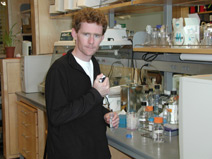 Despite explosive gains in our understanding of the basic mechanisms of human disease, meaningful translation of this knowledge to the treatment and prevention of disease has moved slowly. To accelerate the pace at which discoveries in basic science can serve the health of our patients and community, the University of California, San Francisco (UCSF) intends to establish a Clinical and Translational Science Institute (CTSI). Its mission will be to create a comprehensive, integrated academic home that promotes research and education in clinical and translational science at UCSF, at affiliated institutions, and in participating communities. Its goals are: 1) to support, enhance, and integrate existing training programs, increasing the number of trainees from diverse disciplines and improving the quality of their training in clinical and translational research methods; 2) to support, improve, and integrate existing infrastructure to enhance the design and implementation of clinical and translational studies, fostering collaborations to achieve a diverse spectrum of high-quality, original research; 3) to enhance career development of clinical and translational researchers by providing mentoring and opportunities to catalyze original research, and by changing the academic culture to appropriately reward multidisciplinary collaborative work; and 4) to create a "virtual home" providing contemporary communications to simplify collaboration, to provide an optimal informatics matrix for conducting innovative research, and to nurture the growth of clinical and translational science. To reach these goals, UCSF is transforming its clinical and translational research organization to establish 13 interrelated programs that will provide the training, services, and opportunities needed. These programs are led by senior scientists drawn from diverse disciplines in each of UCSF's four health science schools—dentistry, medicine, nursing, and pharmacy—and its graduate division. The plans reflect input from more than 200 interested, energetic, and committed participants from throughout the community, including most of UCSF's academic leaders. These individuals worked collaboratively to ensure inclusion, transparency, and flexibility in the design and planned implementation of the CTSI. UCSF believes that this infusion of new energy and resources will create and sustain a rich environment for innovative research and drive the realization of UCSF's full potential to educate and to support the work of clinical and translational scientists. If so, biomedicine will be advanced and the health of our patients and the community will benefit.
Despite explosive gains in our understanding of the basic mechanisms of human disease, meaningful translation of this knowledge to the treatment and prevention of disease has moved slowly. To accelerate the pace at which discoveries in basic science can serve the health of our patients and community, the University of California, San Francisco (UCSF) intends to establish a Clinical and Translational Science Institute (CTSI). Its mission will be to create a comprehensive, integrated academic home that promotes research and education in clinical and translational science at UCSF, at affiliated institutions, and in participating communities. Its goals are: 1) to support, enhance, and integrate existing training programs, increasing the number of trainees from diverse disciplines and improving the quality of their training in clinical and translational research methods; 2) to support, improve, and integrate existing infrastructure to enhance the design and implementation of clinical and translational studies, fostering collaborations to achieve a diverse spectrum of high-quality, original research; 3) to enhance career development of clinical and translational researchers by providing mentoring and opportunities to catalyze original research, and by changing the academic culture to appropriately reward multidisciplinary collaborative work; and 4) to create a "virtual home" providing contemporary communications to simplify collaboration, to provide an optimal informatics matrix for conducting innovative research, and to nurture the growth of clinical and translational science. To reach these goals, UCSF is transforming its clinical and translational research organization to establish 13 interrelated programs that will provide the training, services, and opportunities needed. These programs are led by senior scientists drawn from diverse disciplines in each of UCSF's four health science schools—dentistry, medicine, nursing, and pharmacy—and its graduate division. The plans reflect input from more than 200 interested, energetic, and committed participants from throughout the community, including most of UCSF's academic leaders. These individuals worked collaboratively to ensure inclusion, transparency, and flexibility in the design and planned implementation of the CTSI. UCSF believes that this infusion of new energy and resources will create and sustain a rich environment for innovative research and drive the realization of UCSF's full potential to educate and to support the work of clinical and translational scientists. If so, biomedicine will be advanced and the health of our patients and the community will benefit.
Photo: Joseph DeRisi, Ph.D., in his lab at the University of California, San Francisco. (Photo by Felix Aburto, courtesy of UCSF) Download Hi-Res Photo (2.6MB JPG)
University of Pennsylvania
Philadelphia, PA
Institute for Translational Medicine and Therapeutics (ITMAT)
Principal Investigator
Garret A. FitzGerald, M.D.
E-mail:
garret@spirit.gcrc.upenn.edu
Abstract (provided by applicant):
 The Clinical and Translational Research Award (CTSA) has been greeted enthusiastically by the University of Pennsylvania (Penn). A strategic plan had identified clinical and translational research as a priority, leading to formation of the Institute for Translational Medicine and Therapeutics (ITMAT) in January 2005. ITMAT anticipated many aspects of the CTSA—amongst them, inclusion of the GCRC, dedicated "dry" and "wet" bench space for translational research, and a robust educational program, configured on a Master in Translational Research (MTR). This CTSA application prompted intra- and inter-institutional consideration of how to build on this achievement. This has forged a transformational alliance between Penn, the Children's Hospital of Philadelphia (CHOP), the Wistar Institute (WI) and the University of the Sciences in Philadelphia (USP). Faculty from nine of the 12 schools at Penn and from the partner institutions are represented in leadership roles in the response to this CTSA. ITMAT, designated as the "academic home" for clinical and translational research, has been broadened to serve a transinstitutional role. Its structure has been transformed to foster interdisciplinary science from discovery of new molecules through to the study of drug action in large populations. This has been accomplished by developing interdisciplinary centers, related cores, innovative interdisciplinary programs of research, and strategies to engage and inform communities and their physicians. A particular emphasis has been placed on training and innovative programs, which cover the entire career span, engaging undergraduate students through to mature clinicians. The proposal includes the flexible use of the MTR and new tracks in the Master in Clinical Epidemiology (MSCE) with the M.D., Ph.D., V.M.D., M.S.N., D.M.D., and M.B.A. degrees; the set-aside of places for medical school entrants pursuing M.D.-MTR/MSCE degrees; and the flexible use of diverse faculty tracks at Penn and CHOP to broaden physician engagement in research. These initiatives will be pursued in partnership with industry (e.g., GSK, Oracle), the State of Pennsylvania (BioAdvance), the FDA, and a national network of institutions holding CTSAs. An elaborate and diversified approach to tracking the productivity of this program has been developed and will be integrated into a national plan with similar centers. In summary, this initiative has fostered: 1) an integrated strategy to clinical and translational research by Penn, CHOP, the WI and USP; and 2) the transformation of ITMAT. This will permit the development of interdisciplinary structures designed to foster and facilitate research and education in this emerging discipline.
The Clinical and Translational Research Award (CTSA) has been greeted enthusiastically by the University of Pennsylvania (Penn). A strategic plan had identified clinical and translational research as a priority, leading to formation of the Institute for Translational Medicine and Therapeutics (ITMAT) in January 2005. ITMAT anticipated many aspects of the CTSA—amongst them, inclusion of the GCRC, dedicated "dry" and "wet" bench space for translational research, and a robust educational program, configured on a Master in Translational Research (MTR). This CTSA application prompted intra- and inter-institutional consideration of how to build on this achievement. This has forged a transformational alliance between Penn, the Children's Hospital of Philadelphia (CHOP), the Wistar Institute (WI) and the University of the Sciences in Philadelphia (USP). Faculty from nine of the 12 schools at Penn and from the partner institutions are represented in leadership roles in the response to this CTSA. ITMAT, designated as the "academic home" for clinical and translational research, has been broadened to serve a transinstitutional role. Its structure has been transformed to foster interdisciplinary science from discovery of new molecules through to the study of drug action in large populations. This has been accomplished by developing interdisciplinary centers, related cores, innovative interdisciplinary programs of research, and strategies to engage and inform communities and their physicians. A particular emphasis has been placed on training and innovative programs, which cover the entire career span, engaging undergraduate students through to mature clinicians. The proposal includes the flexible use of the MTR and new tracks in the Master in Clinical Epidemiology (MSCE) with the M.D., Ph.D., V.M.D., M.S.N., D.M.D., and M.B.A. degrees; the set-aside of places for medical school entrants pursuing M.D.-MTR/MSCE degrees; and the flexible use of diverse faculty tracks at Penn and CHOP to broaden physician engagement in research. These initiatives will be pursued in partnership with industry (e.g., GSK, Oracle), the State of Pennsylvania (BioAdvance), the FDA, and a national network of institutions holding CTSAs. An elaborate and diversified approach to tracking the productivity of this program has been developed and will be integrated into a national plan with similar centers. In summary, this initiative has fostered: 1) an integrated strategy to clinical and translational research by Penn, CHOP, the WI and USP; and 2) the transformation of ITMAT. This will permit the development of interdisciplinary structures designed to foster and facilitate research and education in this emerging discipline.
Photo: Biomedical research technician pipetting sample for translational therapeutic study at the University of Pennsylvania School of Medicine. (Photo by Dan Naylor, courtesy of the University of Pennsylvania School of Medicine) - Download Hi-Res (5.4MB JPG) Photo
 The Clinical and Translational Science Award was submitted jointly by the University of Pennsylvania, The Children's Hospital of Philadelphia, the Wistar Institute, and the University of the Sciences in Philadelphia. The CTSA grant will foster research across the lifespan for many disorders, such as sleep disorders.
The Clinical and Translational Science Award was submitted jointly by the University of Pennsylvania, The Children's Hospital of Philadelphia, the Wistar Institute, and the University of the Sciences in Philadelphia. The CTSA grant will foster research across the lifespan for many disorders, such as sleep disorders.
Photo: Caitlyn Regan, participating in a sleep study at The Children's Hospital of Philadelphia's sleep lab, with Carole Marcus, M.D.,co-principal investigator of the Clinical and Translational Science Award, and Director of Children's Hospital's Sleep Center and Robert Heinle, M.D., pulmonary fellow. (Photo courtesy of Children's Hospital of Philadelphia) - Download Hi-Res (1.5MB JPG) Photo
University of Pittsburgh
Pittsburgh, PA
Clinical and Translational Science Institute (CTSI)
Principal Investigator
Steven E. Reis, M.D.
E-mail:
reisse@upmc.edu
Abstract (provided by applicant):
As one of the nation's leading academic research centers, the University of Pittsburgh has both an opportunity and an obligation to take the inherent risks associated with reengineering a successful research enterprise and to undertake a transformative initiative that will result in the development and advancement of clinical and translational science as a distinct discipline in western Pennsylvania. The university is committed to transforming its culture, environment, and structure to achieve this goal by forming the Clinical and Translational Science Institute (CTSI). The CTSI will serve as the integrative academic home for clinical and translational scientists across the university's six health sciences schools; Carnegie Mellon University; the University of Pittsburgh Medical Center (UPMC)—one of the nation's largest and most financially successful academic health care systems—and the region. The CTSI's primary focus is to develop, nurture, and support a cadre of clinical and translational scientists by building on the university's existing clinical research training programs to establish a comprehensive program with activities ranging from early research exposure for high school students to advanced doctoral programs. Through "integration and innovation," the CTSI will excel in the development of new biomedical knowledge and the translation of that knowledge from the basic and preclinical research settings to individuals, communities, and health practice. The Children's Hospital of Pittsburgh's General Clinical Research Center (GCRC) and the four sites of the University of Pittsburgh GCRC will be reengineered, integrated, and augmented by new CTSI community-based and minority-health-focused centers to develop efficient, accessible, and widely used participant and clinical interaction resources. The CTSI Center for Clinical and Translational Informatics, which is developing translational research informatics tools for the NCI Cancer Biomedical Informatics Grid Initiative, will infuse informatics tools into the entire lifecycle of clinical research studies and develop an online collaborative research community. Innovative, interdisciplinary research initiatives will be developed through the 10 CTSI resource cores, and translated to health practice via a novel CTSI community partnership program and through centralization of UPMC's extensive clinical networks. The resulting transformations in the institution, scientists, research, and health practice will improve health locally, regionally, and nationally.
University of Rochester
Rochester, NY
University of Rochester Clinical and Translational Science Institute (UR CTSI)
Principal Investigator
David S. Guzick, M.D., Ph.D.
E-mail:
david_guzick@urmc.rochester.edu
Abstract (provided by applicant):
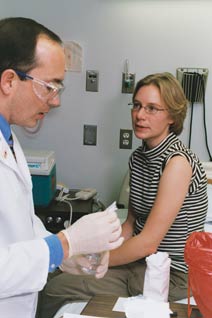 The University of Rochester Clinical and Translational Science Institute (UR CTSI) will be created as the academic home for clinical and translational science, providing a centralized, integrated infrastructure. Under a system of governance in which the UR CTSI program director has authority over space, faculty, budgets, and other resources related to the CTSI, and in which much of the current GCRC budget is distributed to CTSI in support of these key functions, the university plans to transform the two distinct research fields of clinical and translational science into a single new discipline. The goals of this discipline include the creation of new knowledge and techniques to diagnose, prevent, and treat human disease, and the establishment of an environment that catalyzes their application to clinical practice in the community. To achieve these goals, the university proposes specific aims involving: novel methodologies; pilot studies; upgraded biomedical informatics, epidemiology, research design, ethics, and regulatory support; community engagement; new technology and resource cores; new educational and training programs; an upstate New York consortium; and rigorous evaluation and measurement of performance outcomes. Strategic planning for the UR CTSI has been underway for several years. Evidence of institutional support includes commitment to a new 150,000-square-foot Clinical and Translational Science Building (CTSB) in which faculty conducting clinical and translational research will be brought together with students and trainees in existing and new degree-granting programs; with supporting regulatory and administrative functions; and with faculty working in collaborative disciplines such as biostatistics, epidemiology, and biomedical informatics. The director and co-directors of the UR CTSI will integrate the clinical and translational science functions contained in the CTSB with those functions located at other campus locations, such as functional genomics, other translational resources, and the General Clinical Research Center (GCRC). As an integral part of the CTSI, the GCRC will move into a newly-renovated 10,500-square-foot facility across the street from the CTSB, with enhanced functionality and subject access. As well, the UR CTSI will create two-way synergies with local community groups such as the school system, faith community, businesses, foundations, and other upstate New York institutions. Further, the UR CTSI will enable the sharing of data across disciplines and across institutions while ensuring the privacy and confidentiality of human subjects. In summary, by coalescing and integrating new facilities with enhanced infrastructure, community and state-wide partnerships, a strong foundation of existing research and training, and a fundamentally reorganized administrative structure, the CTSI will transform the conduct of clinical and translational science at UR and contribute nationally to the forging of this new discipline.
The University of Rochester Clinical and Translational Science Institute (UR CTSI) will be created as the academic home for clinical and translational science, providing a centralized, integrated infrastructure. Under a system of governance in which the UR CTSI program director has authority over space, faculty, budgets, and other resources related to the CTSI, and in which much of the current GCRC budget is distributed to CTSI in support of these key functions, the university plans to transform the two distinct research fields of clinical and translational science into a single new discipline. The goals of this discipline include the creation of new knowledge and techniques to diagnose, prevent, and treat human disease, and the establishment of an environment that catalyzes their application to clinical practice in the community. To achieve these goals, the university proposes specific aims involving: novel methodologies; pilot studies; upgraded biomedical informatics, epidemiology, research design, ethics, and regulatory support; community engagement; new technology and resource cores; new educational and training programs; an upstate New York consortium; and rigorous evaluation and measurement of performance outcomes. Strategic planning for the UR CTSI has been underway for several years. Evidence of institutional support includes commitment to a new 150,000-square-foot Clinical and Translational Science Building (CTSB) in which faculty conducting clinical and translational research will be brought together with students and trainees in existing and new degree-granting programs; with supporting regulatory and administrative functions; and with faculty working in collaborative disciplines such as biostatistics, epidemiology, and biomedical informatics. The director and co-directors of the UR CTSI will integrate the clinical and translational science functions contained in the CTSB with those functions located at other campus locations, such as functional genomics, other translational resources, and the General Clinical Research Center (GCRC). As an integral part of the CTSI, the GCRC will move into a newly-renovated 10,500-square-foot facility across the street from the CTSB, with enhanced functionality and subject access. As well, the UR CTSI will create two-way synergies with local community groups such as the school system, faith community, businesses, foundations, and other upstate New York institutions. Further, the UR CTSI will enable the sharing of data across disciplines and across institutions while ensuring the privacy and confidentiality of human subjects. In summary, by coalescing and integrating new facilities with enhanced infrastructure, community and state-wide partnerships, a strong foundation of existing research and training, and a fundamentally reorganized administrative structure, the CTSI will transform the conduct of clinical and translational science at UR and contribute nationally to the forging of this new discipline.
Photo: John Treanor, M.D., professor of medicine and a director of the University of Rochester's Vaccine and Treatment Evaluation Unit, is a leading investigator of vaccines for bird flu and other diseases. He also will be active in the Rochester Clinical and Translational Research Institute. (Photo courtesy of University of Rochester) - Download Hi-Res (3.2MB JPG) Photo
University of Texas Health Science Center at Houston
Houston, TX
Center for Clinical and Translational Sciences (CCTS)
Principal Investigator
Frank C. Arnett, M.D.
E-mail:
frank.c.arnett@uth.tmc.edu
Abstract (provided by applicant):
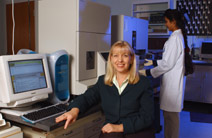 The University of Texas Health Science Center at Houston (UTHSC-H) proposes to establish a Center for Clinical and Translational Sciences (CCTS) at the Texas Medical Center (TMC) in Houston. Participating faculty and trainees in the CCTS will include those from the UTHSC-H component degree-granting schools, including its Medical School, School of Public Health, Graduate School of Biomedical Sciences, School of Health Information Sciences, School of Nursing, Dental Branch, and Brown Foundation Institute of Molecular Medicine (IMM), as well as collaborating faculty/facilities The University of Texas M.D. Anderson Cancer Center (MDACC), which also is located in the TMC. The academic "home" for the CCTS will be in 11,422 square feet of newly renovated space at the UT Medical School, which is physically joined to Memorial Hermann-Texas Medical Center and serves as its partner and primary teaching hospital. The CCTS "home" will administer all aspects of the CCTS; and provide space and resources for faculty and trainees, along with expertise in study design, biostatistics, regulatory issues, ethics, bioinformatics, funding of pilot and feasibility studies, provision of resources, protected time for clinical and translational faculty and trainees, and interactions/collaborations with the various communities and industry. For participant and clinical interactions resources (PCIR), the CCTS will subsume the UTHSC-H General Clinical Research Center (GCRC) at Memorial Hermann, the satellite UTHSC-H GCRC at Brownsville, Texas, and, in part, the MDACC Clinical and Translational Research Center, to enhance research productivity and efficiency. In its educational component, the CCTS will subsume, in part, the current Center for Clinical Research and Evidence-Based Medicine, which has developed and currently provides formal classes, mentoring, and a Master of Clinical Research (MCR) degree at UTHSC-H, and an active NCRR K30 award at MDACC. Also proposed in the application is a novel T32 application offering combinations of master's and doctoral degrees in community health sciences, biomedical sciences and/or biomedical informatics—primarily for pre-doctoral students—and a K12 application for post-doctoral trainees and junior faculty. The CCTS also will subsume core translational laboratories, including a genotyping/sequencing core, a biomarkers core offering DNA microarray, RT-PCR and proteomics services, an immune monitoring core, an MRI core, and a biobanking core. A CCTS "think tank" composed of highly accomplished translational and clinical investigators, basic scientists and educators, and community representatives, will come together as an "engine for innovation" to bring forward and recommend the application of novel and emerging scientific information, methods, and technologies to research into human health and diseases across specialties, disciplines, and communities.
The University of Texas Health Science Center at Houston (UTHSC-H) proposes to establish a Center for Clinical and Translational Sciences (CCTS) at the Texas Medical Center (TMC) in Houston. Participating faculty and trainees in the CCTS will include those from the UTHSC-H component degree-granting schools, including its Medical School, School of Public Health, Graduate School of Biomedical Sciences, School of Health Information Sciences, School of Nursing, Dental Branch, and Brown Foundation Institute of Molecular Medicine (IMM), as well as collaborating faculty/facilities The University of Texas M.D. Anderson Cancer Center (MDACC), which also is located in the TMC. The academic "home" for the CCTS will be in 11,422 square feet of newly renovated space at the UT Medical School, which is physically joined to Memorial Hermann-Texas Medical Center and serves as its partner and primary teaching hospital. The CCTS "home" will administer all aspects of the CCTS; and provide space and resources for faculty and trainees, along with expertise in study design, biostatistics, regulatory issues, ethics, bioinformatics, funding of pilot and feasibility studies, provision of resources, protected time for clinical and translational faculty and trainees, and interactions/collaborations with the various communities and industry. For participant and clinical interactions resources (PCIR), the CCTS will subsume the UTHSC-H General Clinical Research Center (GCRC) at Memorial Hermann, the satellite UTHSC-H GCRC at Brownsville, Texas, and, in part, the MDACC Clinical and Translational Research Center, to enhance research productivity and efficiency. In its educational component, the CCTS will subsume, in part, the current Center for Clinical Research and Evidence-Based Medicine, which has developed and currently provides formal classes, mentoring, and a Master of Clinical Research (MCR) degree at UTHSC-H, and an active NCRR K30 award at MDACC. Also proposed in the application is a novel T32 application offering combinations of master's and doctoral degrees in community health sciences, biomedical sciences and/or biomedical informatics—primarily for pre-doctoral students—and a K12 application for post-doctoral trainees and junior faculty. The CCTS also will subsume core translational laboratories, including a genotyping/sequencing core, a biomarkers core offering DNA microarray, RT-PCR and proteomics services, an immune monitoring core, an MRI core, and a biobanking core. A CCTS "think tank" composed of highly accomplished translational and clinical investigators, basic scientists and educators, and community representatives, will come together as an "engine for innovation" to bring forward and recommend the application of novel and emerging scientific information, methods, and technologies to research into human health and diseases across specialties, disciplines, and communities.
Photo: Dianna Milewicz, M.D., Ph.D., professor and director of medical genetics at The University of Texas Medical School at Houston, directs research in the Genetics Core Lab. The lab will help facilitate more rapid research results at UT-Houston's Center for Clinical and Translations Sciences. (Photo by Ester Fant, courtesy of The University of Texas Health Science Center at Houston) - Download Hi-Res (1.7MB JPG) Photo
Yale University
New Haven, CT
Yale Center for Clinical Investigation (YCCI)
Principal Investigator
Robert S. Sherwin, M.D.
E-mail:
robert.sherwin@yale.edu
Abstract (provided by applicant):
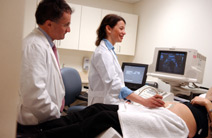 The Yale Center for Clinical Investigation (YCCI) was created to provide a "home" for training the next generation of clinical investigators. Key programmatic goals are to: 1) attract highly talented students and junior faculty across medicine, nursing, public health, biological sciences, and biomedical engineering; train them in the use of state-of-the-art research tools; give them the skills to work within complex research teams; and support their professional development; and 2) foster the translation of disease-related discoveries from the laboratory into the community by: stimulating the creation of interdisciplinary teams; making available state-of-the-art core facilities and expanded biostatistical and bioinformatics resources; establishing organizational and regulatory infrastructure for clinical studies; and forging a dynamic new partnership that will integrate community leaders, physicians, and health centers. Participating institutions include the Schools of Medicine, Nursing, Public Health, the Department of Biomedical Engineering, and graduate programs in biological and biomedical sciences. The investigative medicine program (IMP) is central to YCCI's education and training efforts. It is a unique doctoral program that offers Ph.D. degrees in health sciences research to highly qualified M.D. fellows embarking on careers in translational or clinical research. IMP will be expanded with CTSA support to include nursing, public health, biological sciences, and M.D.-Ph.D. students. YCCI has also created a Society of YCCI Faculty Mentors who will participate actively in the training and nurturing of the students and junior faculty members identified as YCCI Clinical Scholars. Pilot and feasibility grants will be awarded for: 1) junior faculty; 2) interdisciplinary translational teams; 3) new technologies; and 4) community-based projects. YCCI will cluster research cores around common themes, including: imaging; specimen analysis; physiology; cognition and behavior; drug development; and cell therapy. A new office of research services will provide facilities for "one-stop" shopping for regulatory, biostatistical, bioinformatics, recruitment, and other support services. YCCI will have an office to coordinate the university's efforts to address health issues facing our community. The university's decision to immediately provide substantial support to establish the YCCI reflects its strong commitment to an innovative redesign of our clinical and translational research activities.
The Yale Center for Clinical Investigation (YCCI) was created to provide a "home" for training the next generation of clinical investigators. Key programmatic goals are to: 1) attract highly talented students and junior faculty across medicine, nursing, public health, biological sciences, and biomedical engineering; train them in the use of state-of-the-art research tools; give them the skills to work within complex research teams; and support their professional development; and 2) foster the translation of disease-related discoveries from the laboratory into the community by: stimulating the creation of interdisciplinary teams; making available state-of-the-art core facilities and expanded biostatistical and bioinformatics resources; establishing organizational and regulatory infrastructure for clinical studies; and forging a dynamic new partnership that will integrate community leaders, physicians, and health centers. Participating institutions include the Schools of Medicine, Nursing, Public Health, the Department of Biomedical Engineering, and graduate programs in biological and biomedical sciences. The investigative medicine program (IMP) is central to YCCI's education and training efforts. It is a unique doctoral program that offers Ph.D. degrees in health sciences research to highly qualified M.D. fellows embarking on careers in translational or clinical research. IMP will be expanded with CTSA support to include nursing, public health, biological sciences, and M.D.-Ph.D. students. YCCI has also created a Society of YCCI Faculty Mentors who will participate actively in the training and nurturing of the students and junior faculty members identified as YCCI Clinical Scholars. Pilot and feasibility grants will be awarded for: 1) junior faculty; 2) interdisciplinary translational teams; 3) new technologies; and 4) community-based projects. YCCI will cluster research cores around common themes, including: imaging; specimen analysis; physiology; cognition and behavior; drug development; and cell therapy. A new office of research services will provide facilities for "one-stop" shopping for regulatory, biostatistical, bioinformatics, recruitment, and other support services. YCCI will have an office to coordinate the university's efforts to address health issues facing our community. The university's decision to immediately provide substantial support to establish the YCCI reflects its strong commitment to an innovative redesign of our clinical and translational research activities.
Photo: Charles J. Lockwood, M.D., chair of Obstetrics, Gynecology & Reproductive Sciences at Yale School of Medicine , consults with a patient on an ultrasound with Sifa Turan, former postdoctoral fellow and sonographer at Yale Ob/Gyn. (Photo courtesy of Yale University) - Download Hi-Res (1.5MB JPG) Photo
, consults with a patient on an ultrasound with Sifa Turan, former postdoctoral fellow and sonographer at Yale Ob/Gyn. (Photo courtesy of Yale University) - Download Hi-Res (1.5MB JPG) Photo

